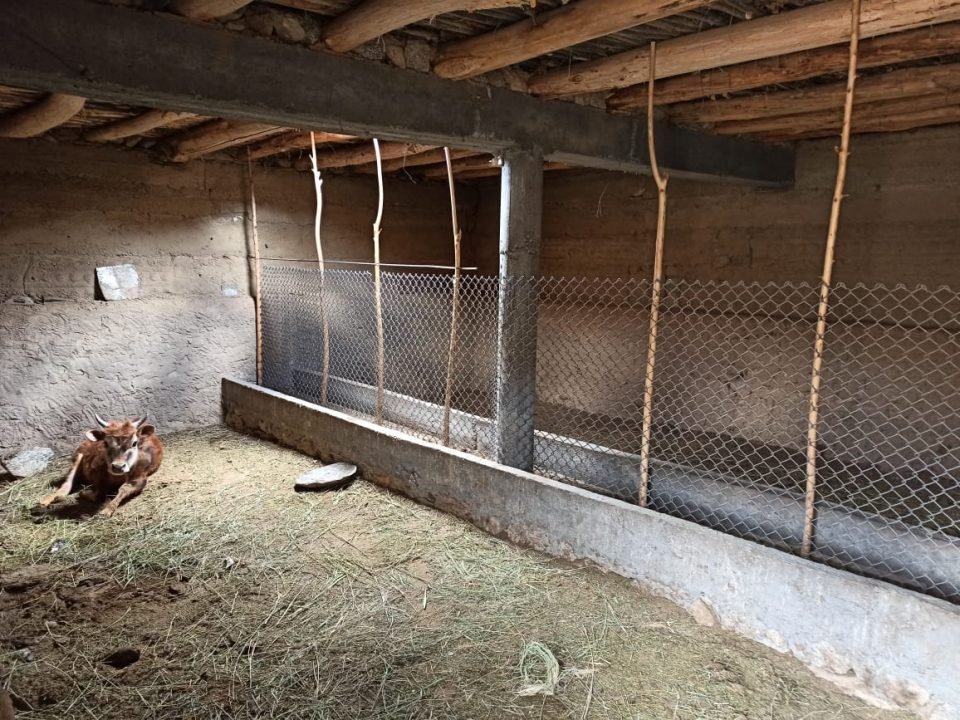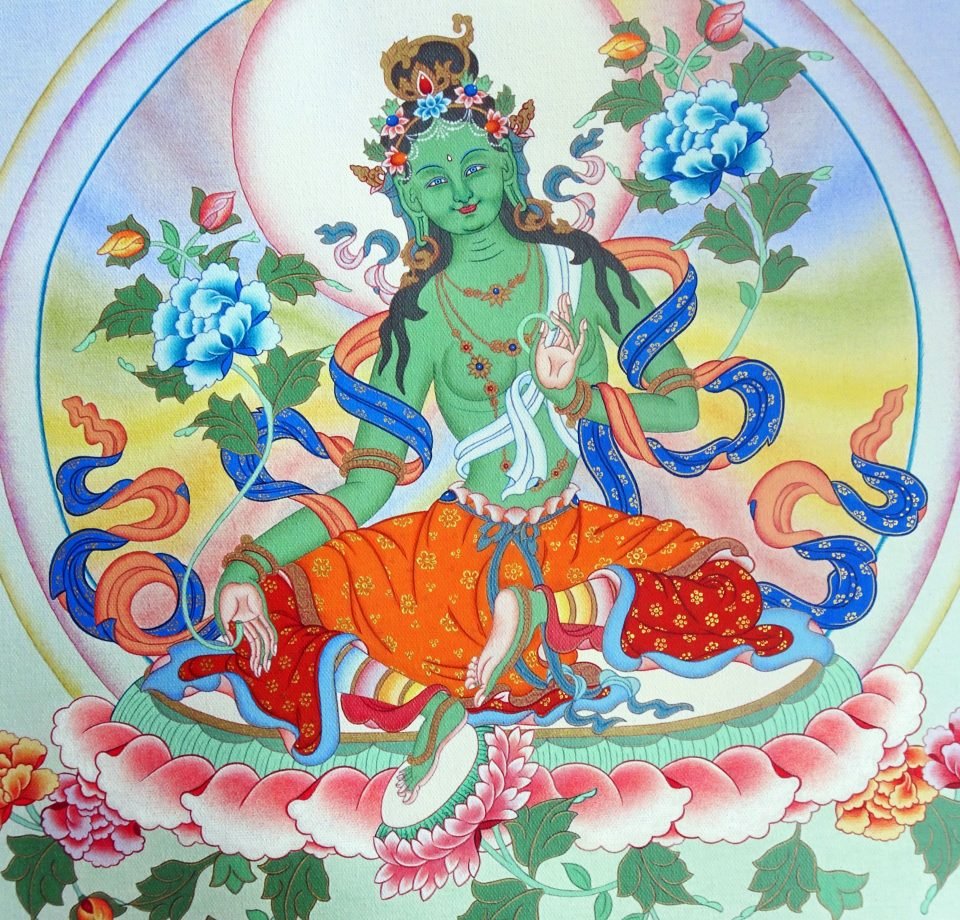- Home
- FPMT Homepage
Foundation for the Preservation of the Mahayana Tradition
The FPMT is an organization devoted to preserving and spreading Mahayana Buddhism worldwide by creating opportunities to listen, reflect, meditate, practice and actualize the unmistaken teachings of the Buddha and based on that experience spreading the Dharma to sentient beings. We provide integrated education through which people’s minds and hearts can be transformed into their highest potential for the benefit of others, inspired by an attitude of universal responsibility and service. We are committed to creating harmonious environments and helping all beings develop their full potential of infinite wisdom and compassion. Our organization is based on the Buddhist tradition of Lama Tsongkhapa of Tibet as taught to us by our founders Lama Thubten Yeshe and Lama Thubten Zopa Rinpoche.
- Willkommen
Die Stiftung zur Erhaltung der Mahayana Tradition (FPMT) ist eine Organisation, die sich weltweit für die Erhaltung und Verbreitung des Mahayana-Buddhismus einsetzt, indem sie Möglichkeiten schafft, den makellosen Lehren des Buddha zuzuhören, über sie zur reflektieren und zu meditieren und auf der Grundlage dieser Erfahrung das Dharma unter den Lebewesen zu verbreiten.
Wir bieten integrierte Schulungswege an, durch denen der Geist und das Herz der Menschen in ihr höchstes Potential verwandelt werden zum Wohl der anderen – inspiriert durch eine Haltung der universellen Verantwortung und dem Wunsch zu dienen. Wir haben uns verpflichtet, harmonische Umgebungen zu schaffen und allen Wesen zu helfen, ihr volles Potenzial unendlicher Weisheit und grenzenlosen Mitgefühls zu verwirklichen.
Unsere Organisation basiert auf der buddhistischen Tradition von Lama Tsongkhapa von Tibet, so wie sie uns von unseren Gründern Lama Thubten Yeshe und Lama Thubten Zopa Rinpoche gelehrt wird.
- Bienvenidos
La Fundación para la preservación de la tradición Mahayana (FPMT) es una organización que se dedica a preservar y difundir el budismo Mahayana en todo el mundo, creando oportunidades para escuchar, reflexionar, meditar, practicar y actualizar las enseñanzas inconfundibles de Buda y en base a esa experiencia difundir el Dharma a los seres.
Proporcionamos una educación integrada a través de la cual las mentes y los corazones de las personas se pueden transformar en su mayor potencial para el beneficio de los demás, inspirados por una actitud de responsabilidad y servicio universales. Estamos comprometidos a crear ambientes armoniosos y ayudar a todos los seres a desarrollar todo su potencial de infinita sabiduría y compasión.
Nuestra organización se basa en la tradición budista de Lama Tsongkhapa del Tíbet como nos lo enseñaron nuestros fundadores Lama Thubten Yeshe y Lama Zopa Rinpoche.
A continuación puede ver una lista de los centros y sus páginas web en su lengua preferida.
- Bienvenue
L’organisation de la FPMT a pour vocation la préservation et la diffusion du bouddhisme du mahayana dans le monde entier. Elle offre l’opportunité d’écouter, de réfléchir, de méditer, de pratiquer et de réaliser les enseignements excellents du Bouddha, pour ensuite transmettre le Dharma à tous les êtres. Nous proposons une formation intégrée grâce à laquelle le cœur et l’esprit de chacun peuvent accomplir leur potentiel le plus élevé pour le bien d’autrui, inspirés par le sens du service et une responsabilité universelle. Nous nous engageons à créer un environnement harmonieux et à aider tous les êtres à épanouir leur potentiel illimité de compassion et de sagesse. Notre organisation s’appuie sur la tradition guéloukpa de Lama Tsongkhapa du Tibet, telle qu’elle a été enseignée par nos fondateurs Lama Thoubtèn Yéshé et Lama Zopa Rinpoché.
Visitez le site de notre Editions Mahayana pour les traductions, conseils et nouvelles du Bureau international en français.
Voici une liste de centres et de leurs sites dans votre langue préférée
- Benvenuto
L’FPMT è un organizzazione il cui scopo è preservare e diffondere il Buddhismo Mahayana nel mondo, creando occasioni di ascolto, riflessione, meditazione e pratica dei perfetti insegnamenti del Buddha, al fine di attualizzare e diffondere il Dharma fra tutti gli esseri senzienti.
Offriamo un’educazione integrata, che può trasformare la mente e i cuori delle persone nel loro massimo potenziale, per il beneficio di tutti gli esseri, ispirati da un’attitudine di responsabilità universale e di servizio.
Il nostro obiettivo è quello di creare contesti armoniosi e aiutare tutti gli esseri a sviluppare in modo completo le proprie potenzialità di infinita saggezza e compassione.
La nostra organizzazione si basa sulla tradizione buddhista di Lama Tsongkhapa del Tibet, così come ci è stata insegnata dai nostri fondatori Lama Thubten Yeshe e Lama Zopa Rinpoche.
Di seguito potete trovare un elenco dei centri e dei loro siti nella lingua da voi prescelta.
- 欢迎 / 歡迎
简体中文
“护持大乘法脉基金会”( 英文简称:FPMT。全名:Foundation for the Preservation of the Mahayana Tradition) 是一个致力于护持和弘扬大乘佛法的国际佛教组织。我们提供听闻,思维,禅修,修行和实证佛陀无误教法的机会,以便让一切众生都能够享受佛法的指引和滋润。
我们全力创造和谐融洽的环境, 为人们提供解行并重的完整佛法教育,以便启发内在的环宇悲心及责任心,并开发内心所蕴藏的巨大潜能 — 无限的智慧与悲心 — 以便利益和服务一切有情。
FPMT的创办人是图腾耶喜喇嘛和喇嘛梭巴仁波切。我们所修习的是由两位上师所教导的,西藏喀巴大师的佛法传承。
繁體中文
護持大乘法脈基金會”( 英文簡稱:FPMT。全名:Found
ation for the Preservation of the Mahayana Tradition ) 是一個致力於護持和弘揚大乘佛法的國際佛教組織。我們提供聽聞, 思維,禪修,修行和實證佛陀無誤教法的機會,以便讓一切眾生都能 夠享受佛法的指引和滋潤。 我們全力創造和諧融洽的環境,
為人們提供解行並重的完整佛法教育,以便啟發內在的環宇悲心及責 任心,並開發內心所蘊藏的巨大潛能 — 無限的智慧與悲心 – – 以便利益和服務一切有情。 FPMT的創辦人是圖騰耶喜喇嘛和喇嘛梭巴仁波切。
我們所修習的是由兩位上師所教導的,西藏喀巴大師的佛法傳承。 察看道场信息:
- FPMT Homepage
- News/Media
-
- Study & Practice
-
-
- About FPMT Education Services
- Latest News
- Programs
- New to Buddhism?
- Buddhist Mind Science: Activating Your Potential
- Heart Advice for Death and Dying
- Discovering Buddhism
- Living in the Path
- Exploring Buddhism
- FPMT Basic Program
- FPMT Masters Program
- FPMT In-Depth Meditation Training
- Maitripa College
- Lotsawa Rinchen Zangpo Translator Program
- Universal Education for Compassion & Wisdom
- Online Learning Center
-
- Prayers & Practice Materials
- Overview of Prayers & Practices
- Full Catalogue of Prayers & Practice Materials
- Explore Popular Topics
- Benefiting Animals
- Chenrezig Resources
- Death & Dying Resources
- Lama Chopa (Guru Puja)
- Lama Zopa Rinpoche: Compendium of Precious Instructions
- Lama Zopa Rinpoche: Life Practice Advice
- Lama Zopa Rinpoche Practice Series
- Lamrim Resources
- Mantras
- Prayer Book Updates
- Purification Practices
- Sutras
- Thought Transformation (Lojong)
- Audio Materials
- Dharma Dates - Tibetan Calendar
- Translation Services
- Publishing Services
- Ways to Offer Support
- Prayers & Practice Materials
-
- Teachings and Advice
- Find Teachings and Advice
- Lama Zopa Rinpoche Advice Page
- Lama Zopa Rinpoche: Compendium of Precious Instructions
- Lama Zopa Rinpoche Video Teachings
- ༧སྐྱབས་རྗེ་བཟོད་པ་རིན་པོ་ཆེ་མཆོག་ནས་སྩལ་བའི་བཀའ་སློབ་བརྙན་འཕྲིན།
- Podcasts
- Lama Yeshe Wisdom Archive
- Buddhism FAQ
- Dharma for Young People
- Resources on Holy Objects
- Teachings and Advice
-
-
*If a menu item has a submenu clicking once will expand the menu clicking twice will open the page.
-
-
- Centers
-
- Teachers
-
- Projects
-
-
-
-
*If a menu item has a submenu clicking once will expand the menu clicking twice will open the page.
-
-
- FPMT
-
-
-
-
-
Proper guru devotion – correct devotion to your virtuous friends – allows you to actualize successfully all the steps of the path to enlightenment, from the perfect human rebirth up to buddhahood itself.
Lama Zopa Rinpoche
-
-
-
- Shop
-
-
-
The Foundation Store is FPMT’s online shop and features a vast selection of Buddhist study and practice materials written or recommended by our lineage gurus. These items include homestudy programs, prayers and practices in PDF or eBook format, materials for children, and other resources to support practitioners.
Items displayed in the shop are made available for Dharma practice and educational purposes, and never for the purpose of profiting from their sale. Please read FPMT Foundation Store Policy Regarding Dharma Items for more information.
-
-
Charitable Activities
27
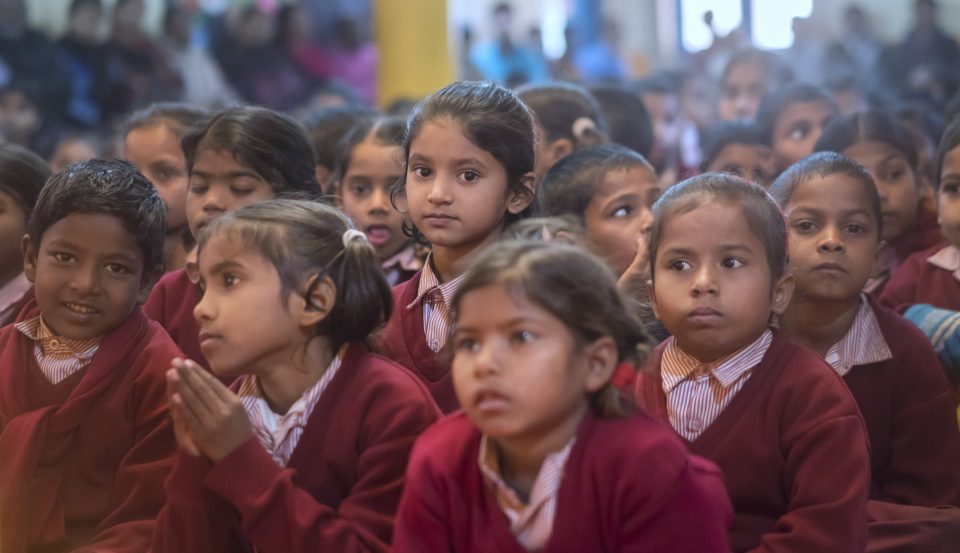
Students of Maitreya School, Bodhgaya, India.
Since 2012 the Social Services Fund has been supporting disadvantaged schools in Nepal and India that have students of Tibetan, Nepali, Sherpa, and Indian heritage. Approximately 1,000 children in orphanages, hostels, and Tibetan refugee communities benefit from this aid.
We invite you to rejoice in the ways we offered educational support to these children this year, thus helping break the cycle of poverty in impoverished areas and to help facilitate both a modern education and Dharma education for those in need.
Schools Supported in 2021
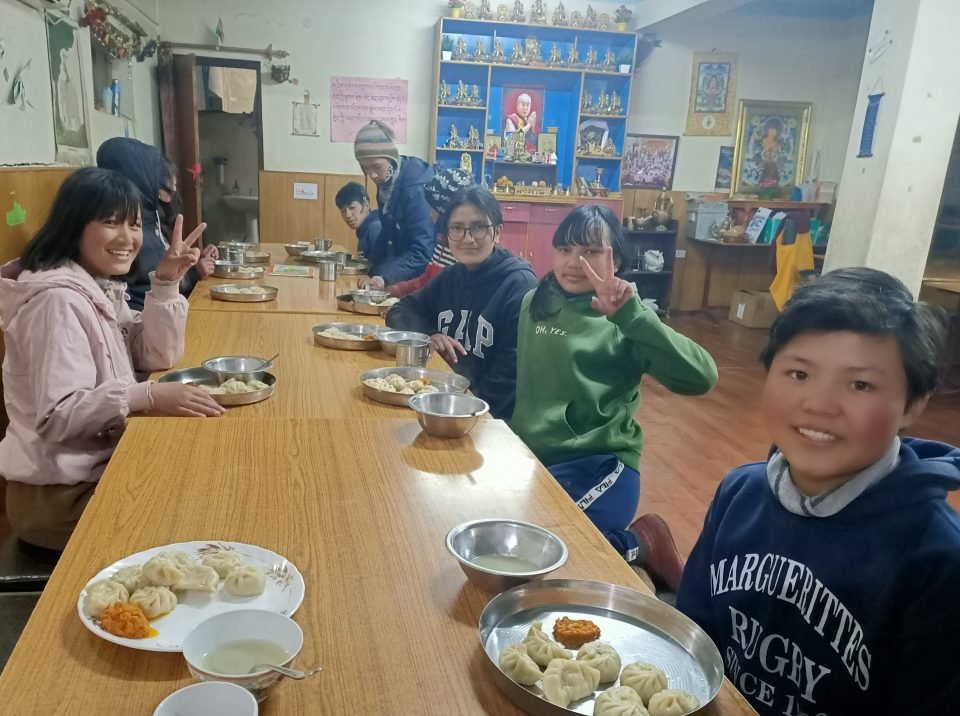
Students of Ngari Institute, Ladakh, enjoying a meal together.
Ngari Institute in Ladakh, India, helps disadvantaged children from remote regions of Ladakh and arranges to send them to, currently, three different schools. The Institute arranges all the costs related to offering this education, including the facility fees, food, uniforms, etc. The Social Services Fund has been covering all the costs of the food for the children and the teachers for eight years. This offering started in 2013 at US$15,720.62, and this year we were so happy to issue a grant for US$33,232.
Rolwaling Sangag Choling Monastery School, established in 2010, educates thirty-two children from poor families across the Dolakha District of Nepal at the primary school level and provides free boarding, medical attention, clothing ,and other needs to its students with the help of four teachers. A number of monks from the local monastery also attend this school. Many Kopan monks come from Rolwaling, so FPMT’s relationship with this school is quite special. It is a free school that also teaches Dharma. We were very happy to send a grant of US$19,187 for the operating costs of this school this year.
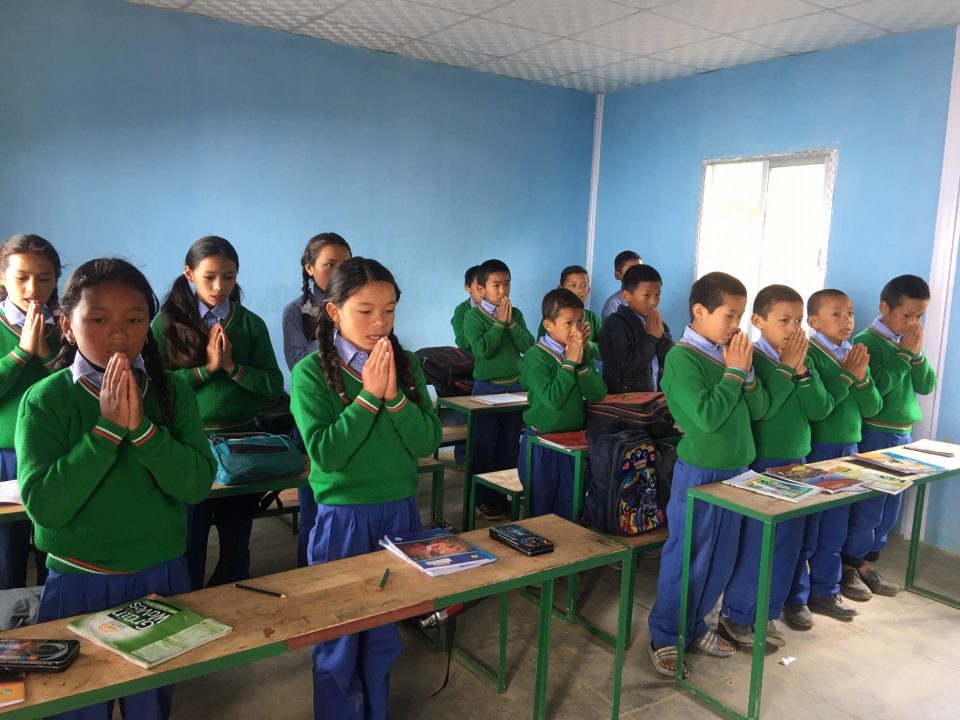
Some of the students of Sangag Dechholing Gonpa School, Taplejung, Nepal.
Sangag Dechholing Gonpa School in Taplejung, Nepal, was established in 2007 to serve the Buddhist community in the area. Seven teachers currently educate 105 students, starting at age three. The curriculum is taught by eleven staff in English and Nepali and focuses on modern subjects such as math and science, while being grounded in Buddhist teachings and culture. In 2021, US$29,908 was sent for operating expenses, which is the annual cost of this free school. Kopan Monastery is now taking over responsibility of this school and FPMT is helping to raise the annual costs through our Social Services Fund.
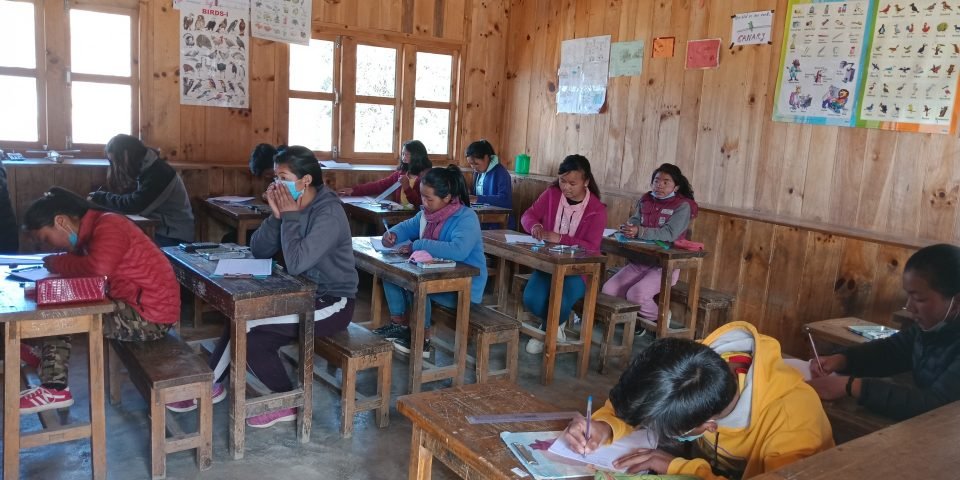
Students of Sagarmatha Secondary School in Chailsa, Nepal.
Sagarmatha Secondary School in Chailsa, Nepal, is located on what was once a Tibetan refugee camp. It currently serves 170 students, including 79 young lay students who live at the school hostel and 25 young monks who live at Thubten Shedrup Ling Monastery, which is a branch of Kopan Monastery and shares the school grounds. Eleven teachers and one additional employee support these students. Since 2015 we have offered annual grants to the school that covers the salaries of teachers in addition to yearly text books and one set of school uniforms per year for the students. We are very happy to continue this commitment with the very year kind help of Yeshe Norbu Association and Unione Buddhista Italiana (U.B.I.). The annual cost is US$30,000 and will be offered at the end of 2021.
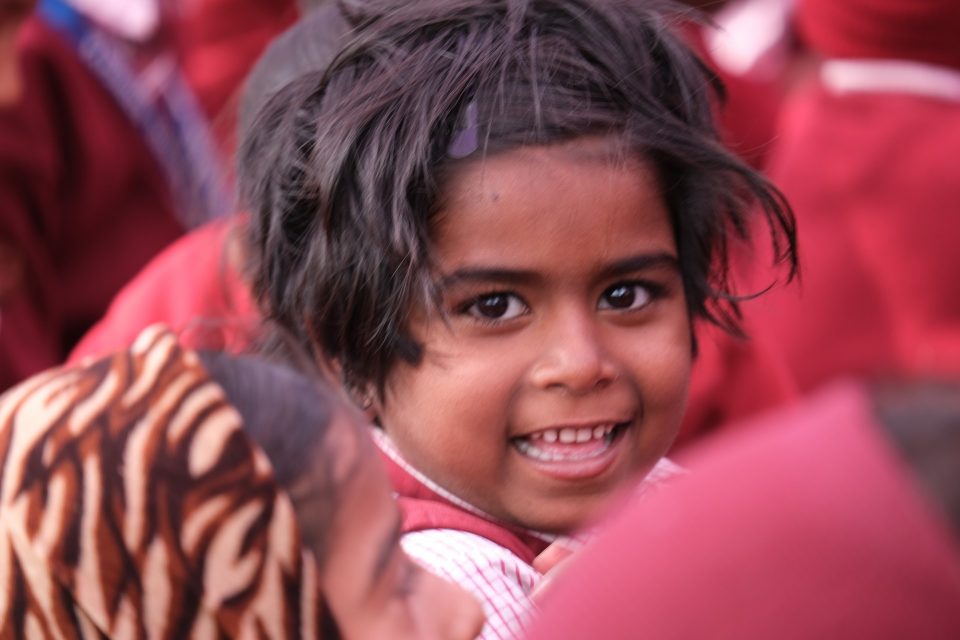
A young student of Maitreya School, Bodhgaya, India.
Maitreya School, which is a social service project of Root Institute, Bodhgaya, India, is a free school benefiting impoverished children from neighboring villages. The school offers children living in one of India’s poorest states a precious opportunity. Not only do they engage in a traditional education but, more importantly, they receive life skills in compassion, honesty, and loving-kindness presented through Buddha’s teachings. The core of the training and vision of the school is: making lives meaningful. The school has a total of 305 students. Since 2012 we have offered yearly support toward the operating costs as well as two new buses for transporting students. In 2021 we offered US$39,200 toward the annual costs of operating the school. The last year the school has been operating in various ways online.
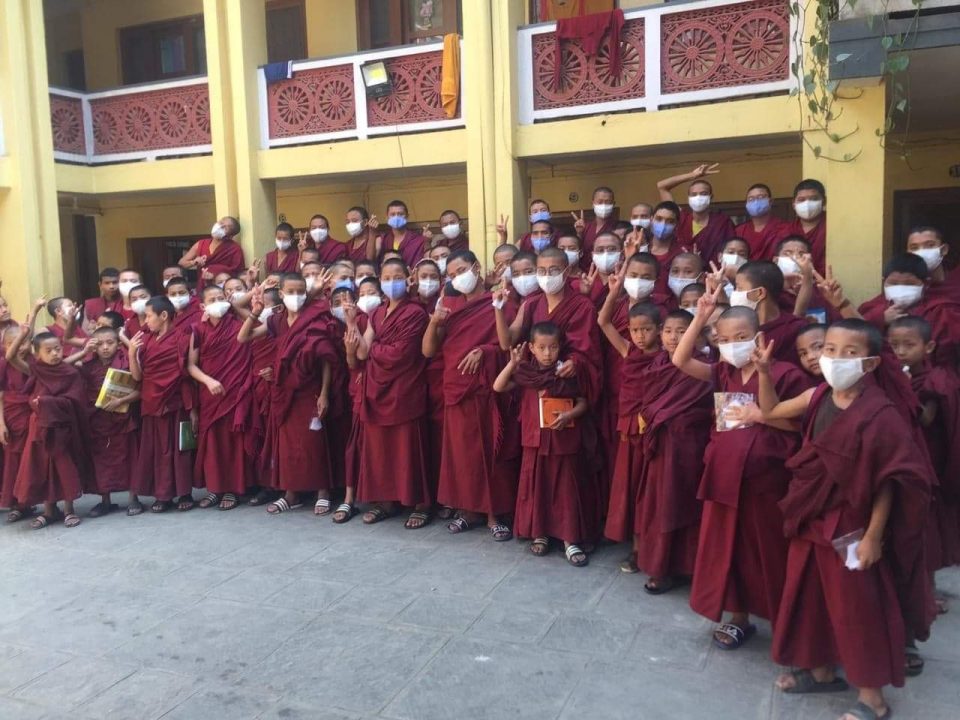
Students of Samtenling School, Khathmandu.
Samtenling Monastery provides the young monks of the monastery a modern, progressive, secular education in Kathmandu, Nepal. Out of 140 monks, 120 of them are aged 6-26. Samtenling School provides education from kindergarten through grade eight. Most of the monks are from Nepal and are primarily Sherpas and Tamangs, but Tibetan monks also attend the monastery and school. The school has been operating without proper facilities. To help with this need, we have been issuing a grant raised from Unione Buddhista Italiana (U.B.I.) in installments over the past two years to build new classrooms and debate courtyard.
In 2021 we offered US$40,402 toward Tashi Lhunpo Monastery in South India for their educational program, covering the salaries of all the teachers and staff, as well as textbooks, stationary, and other resources.
Please join us in rejoicing in another year of support offered to these beneficial schools due to the kindness of so many. Incredibly, US$161,930 was offered toward education this year. Thank you to all the kind donors, including Yeshe Norbu Association and Unione Buddhista Italiana (U.B.I.) who made it possible to offer this substantial support.
The Social Services Fund, established to support Lama Zopa Rinpoche’s Vast Visions for the FPMT organization, focuses efforts primarily in India, Nepal, Tibet and Mongolia. Funds help children, the elderly, sick, and very poor.
All are welcome to support the Social Services Fund and help ensure we can continue to offer support to the education of children in need.
- Tagged: maitreya school, ngari institute, ngari institute of buddhist dialectics, rolwaling sangag choling monastery school, sagarmatha secondary school, samtenling school, sangag dechholing gonpa school
20
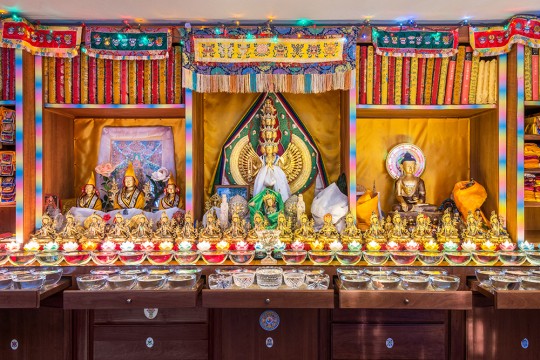
It takes Sangha many hours each day to offer water bowls as part of the extensive offerings at Kachoe Dechen Ling.
Since 1999, Lama Zopa Rinpoche has arranged to have continual extensive offerings of water bowls and lights offered twenty-four hours a day, 365 days a year to create merit for the FPMT organization. Since this began over two decades ago, these offerings have been increasing and are now happening in various parts of the world.
Lama Zopa Rinpoche has explained, “We are not aware of the limitless skies of benefits we achieve from the practice of offering, what we can achieve and enjoy from life to life. Even while you are in samsara, you enjoy good rebirths, wealth, and every happiness. Even just the samsaric perfections are amazing, without adding all those incredible realizations that allow us to offer deep benefit to sentient beings, liberating them from oceans of samsaric suffering and its cause, delusion and karma.”
Rinpoche personally incorporates all of these actual physically made offerings in his daily practices and when doing food offerings he sometimes leads an extensive practice where all of the offerings are visualized and multiplied and then mentally offered to Buddha, Dharma, Sangha and all the holy objects around the world.
Rinpoche advises students, whenever making offerings in our practice, that we can also remember all the other arranged offerings in Kachoe Dechen Ling, CA, US; Buddha Amitabha Pure Land, WA, US; and also in all the FPMT centers around the world, by using these actual offerings as a basis and then visualizing and multiplying them. In this way, we can join in the merit from those having made these extensive offerings every day.
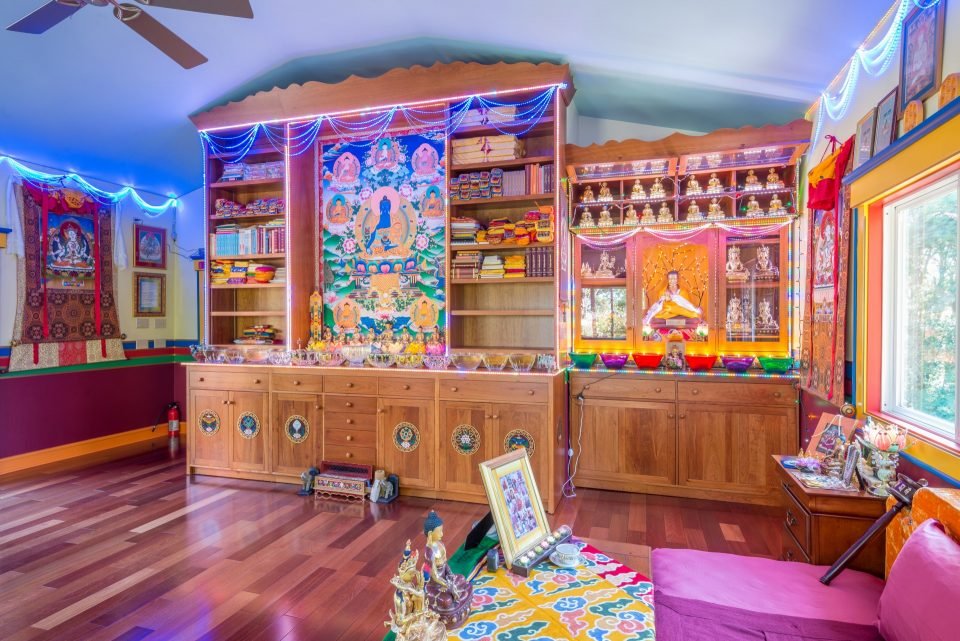
Extensive offerings at Kachoe Dechen Ling, CA, US.
Please Rejoice in Some of the Extensive Offerings Around the World
- Thousands of light offerings, hundreds of water bowls, and a garden full of flower offerings at Kachoe Dechen Ling, CA, US.
- Thousands of light offerings, hundreds of water bowls, and a garden full of flower offerings at Buddha Amitabha Pure Land, WA, US.
- Thousands of light offerings, hundreds of water bowls, and gardens full of flowers offerings at Root Institute, Bodhgaya, India.
- Thousands of lights, hundreds of water bowls and gardens full of flower offering at Kopan Monastery, Nepal.
- 100,000 lights continually offered at Amitabha Buddhist Centre (ABC), Singapore.
- 100,001 lights continually offered at Chokyi Gyaltsen Center, Malaysia.
- Thousands of water bowl offerings, extensive light offerings at Ganden Do Ngag Shedrub Ling Center, Mongolia. These offerings are made daily by a group of very dedicated elderly volunteers.
- Continually burning butter lamp in front of precious stupa with Trulshik Rinpoche’s holy body in Chailsa, Nepal.
- Continually burning butter lamp in front of Guru Lhakang, Thubten Choeling, Chailsa, Nepal
Please rejoice and remember all these extensive offerings that happen every moment of every day!
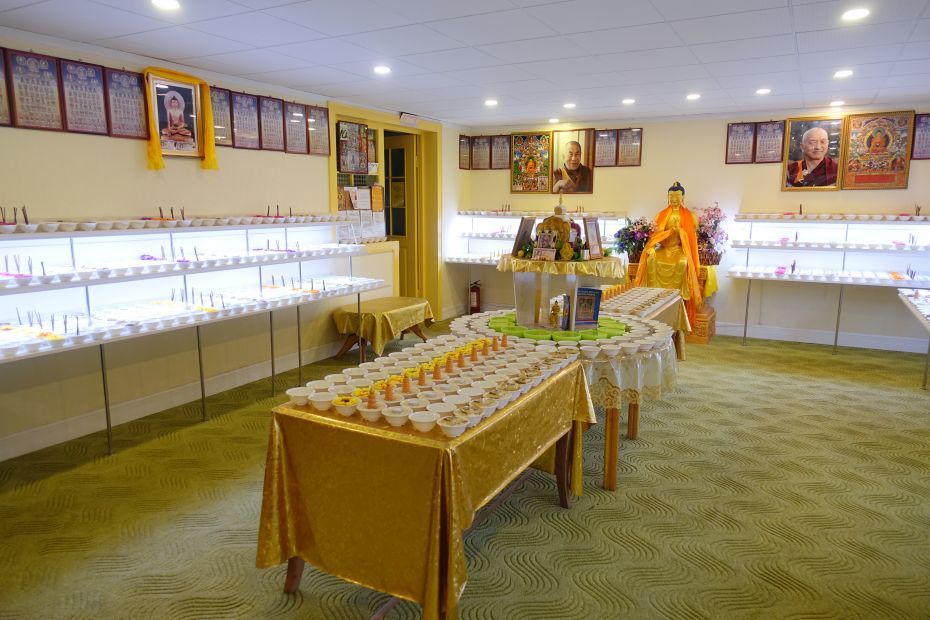
Water bowls and extensive offerings at Ganden Do Ngag Shedrub Ling Center, Mongolia, offered by a dedicated group of elderly volunteers.
The Actual Offering Prayer
The actual offering prayer is recited five times, ten times, one thousand times, or however many times you want to make offerings.
These clouds of (light) offerings, both actually arranged and mentally emanated, filling space,
Are manifestations of my own innate awareness, the dharmakāya.
These clouds of offerings equaling the sky,
I offer to all the gurus, the Three Rare Sublime Ones,
And all the statues, stūpas, and scriptures, which are manifestations of my guru.
By the merits of generating bodhicitta, making charity to the numberless sentient beings, and making these (light) offerings to the gurus, the Three Rare Sublime Ones, and all the holy objects in the ten directions—
For all those sentient beings who rely upon me,
All those for whom I have promised to pray,
All those whose names have been given to me,
And, principally, those who have a connection with me, my servants, benefactors, and disciples
As well as all remaining transmigratory beings, both living and dead—
May the rays of the lights of the five wisdoms completely purify
all their degenerated vows and samayas right now!
May all the sufferings of the evil-gone realms cease right now!
May the three realms of saṃsāra be emptied right now!
May all impure minds and obscurations be purified right now!
May all impure appearances be purified right now!
May the five holy bodies and wisdoms spontaneously arise!
—From Extensive Offering Practice: A Practice to Accumulate the Most Extensive Merit with Light and Other Offerings by Lama Zopa Rinpoche
Through the Lama Zopa Rinpoche Bodhichitta Fund Rinpoche supports a number of Sangha to make many of these offerings daily, as well as covering the cost of electricity for the extensive light offerings at Kachoe Dechen Ling, Buddha Amitabha Pure Land, Kopan Monastery in 2021, and Root Institute, as well as the butter for the continual light offerings in Nepal and also occasionally the meals to the kind volunteers of Ganden Do Ngag Shedrub Ling Center, Mongolia.
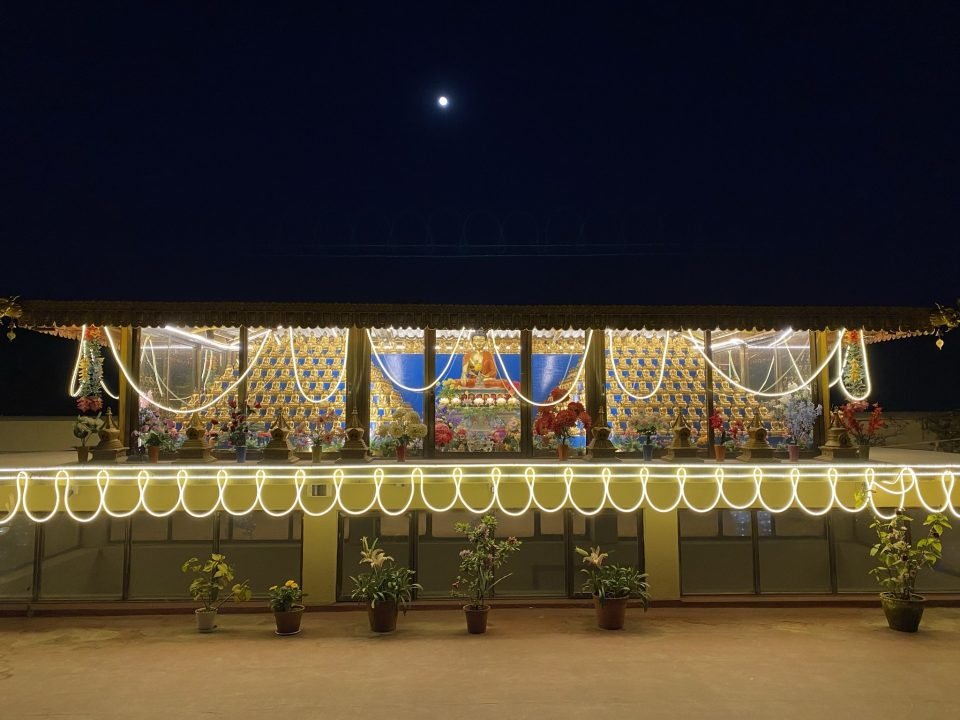
Extensive offerings at Kopan Monastery, Nepal.
You can learn more about the many beneficial activities of the Lama Zopa Rinpoche Bodhichitta Fund or other Charitable Projects of FPMT.
13
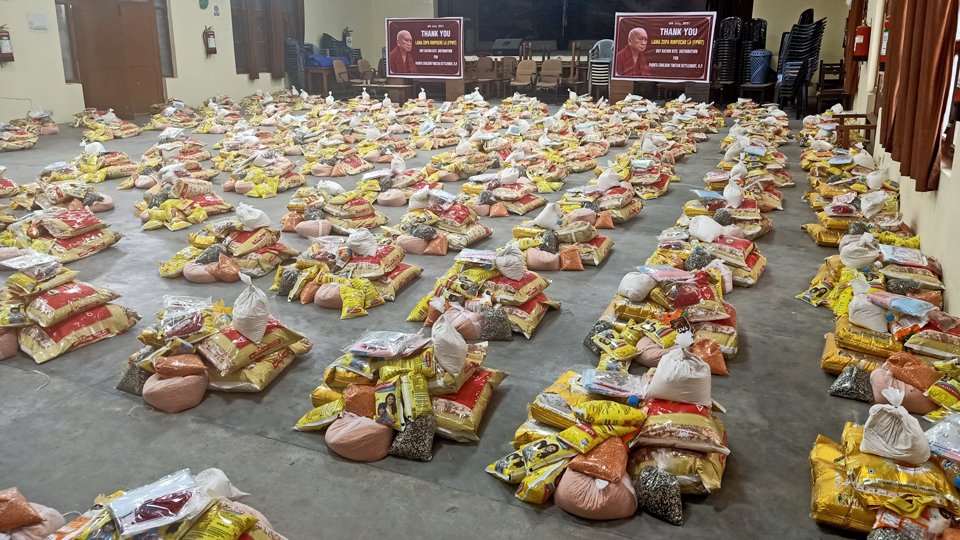
Food ready for distribution, Paonta Cholsum Tibetan Settlement, Himachal Pradesh, India, July 2021. Photo courtesy of Paonta Cholsum Tibetan Settlement.
The COVID-19 pandemic has created hardship around the world. Paonta Cholsum Tibetan Settlement, located in Paonta Sahib Himachal Pradesh, India, has lost a significant source of income due to lockdown restrictions. The settlement recently reached out to Lama Zopa Rinpoche for assistance with food.
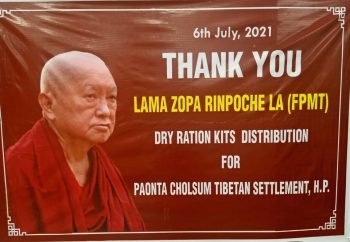
Banner at food distribution site, Paonta Cholsum Tibetan Settlement, Himachal Pradesh, India, July 2021. Photo courtesy of Paonta Cholsum Tibetan Settlement.
On the occasion of His Holiness the Dalai Lama’s 86th Birthday, Mr Gelek Jamyang, the settlement officer, wanted to make an auspicious offering to help 125 families with food. Lama Zopa Rinpoche was extremely happy to be able to offer support in this way and through FPMT Social Services Fund. The food offered to the 125 families included essential staples of rice, atta (wheat flour), cooking oil, dal, and eggs.
According to the settlement officer, ninety percent of the settlers earn their livelihood through winter sweater sales in different states of India. Due to COVID-19 restrictions, winter sweater sales have not happened for two years. The settlement relies on the sales income to support their daily expenses.
Please rejoice that we were able to join in this offering made on the occasion of His Holiness the Dalai Lama’s birthday.
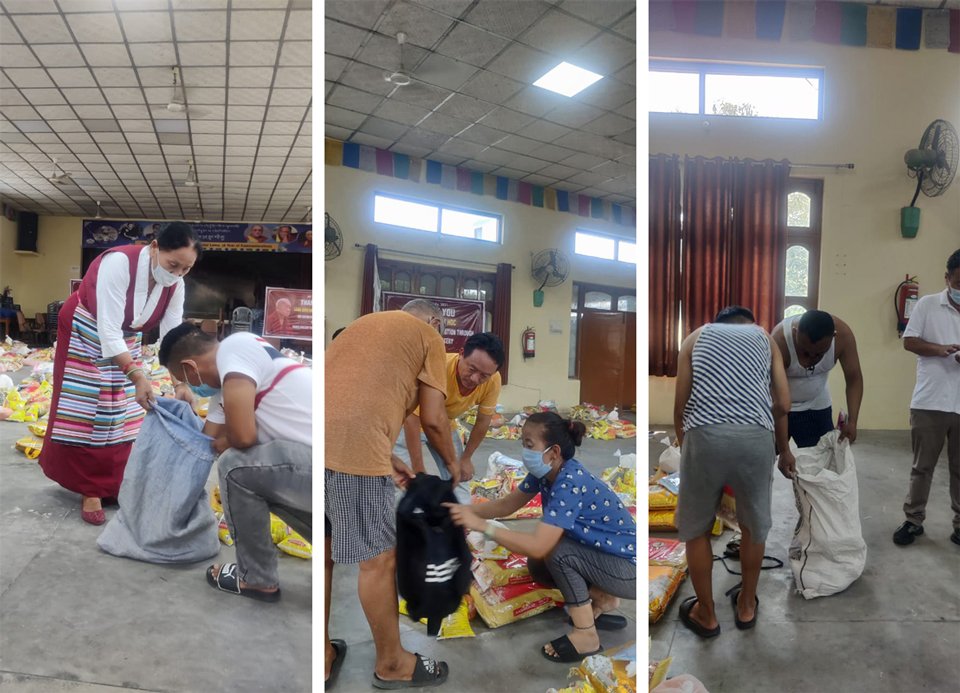
Images of the food distribution on His Holiness the Dalai Lama’s birthday, Paonta Cholsum Tibetan Settlement, Himachal Pradesh, India, July 2021. Photo courtesy of Paonta Cholsum Tibetan Settlement.
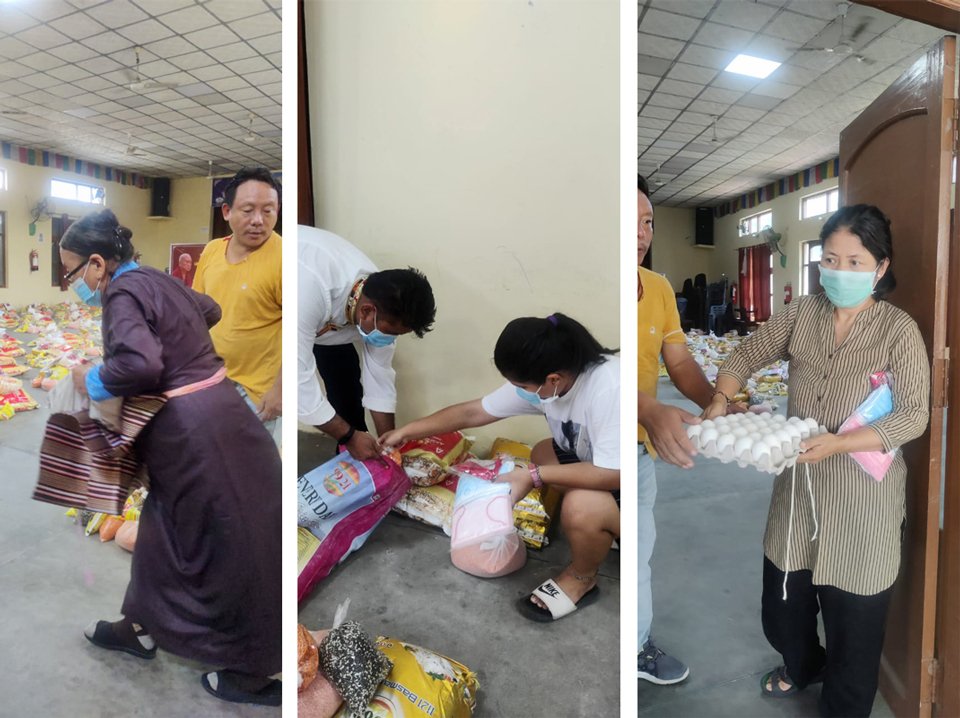
Images of the food distribution on His Holiness the Dalai Lama’s birthday, Paonta Cholsum Tibetan Settlement, Himachal Pradesh, India, July 2021. Photo courtesy of Paonta Cholsum Tibetan Settlement.
All are welcome to support the Social Services Fund and help ensure we can offer direct support to Tibetan refugees in need.
7
Support to Seven Elderly Homes Serving Tibetan Elders in 2021
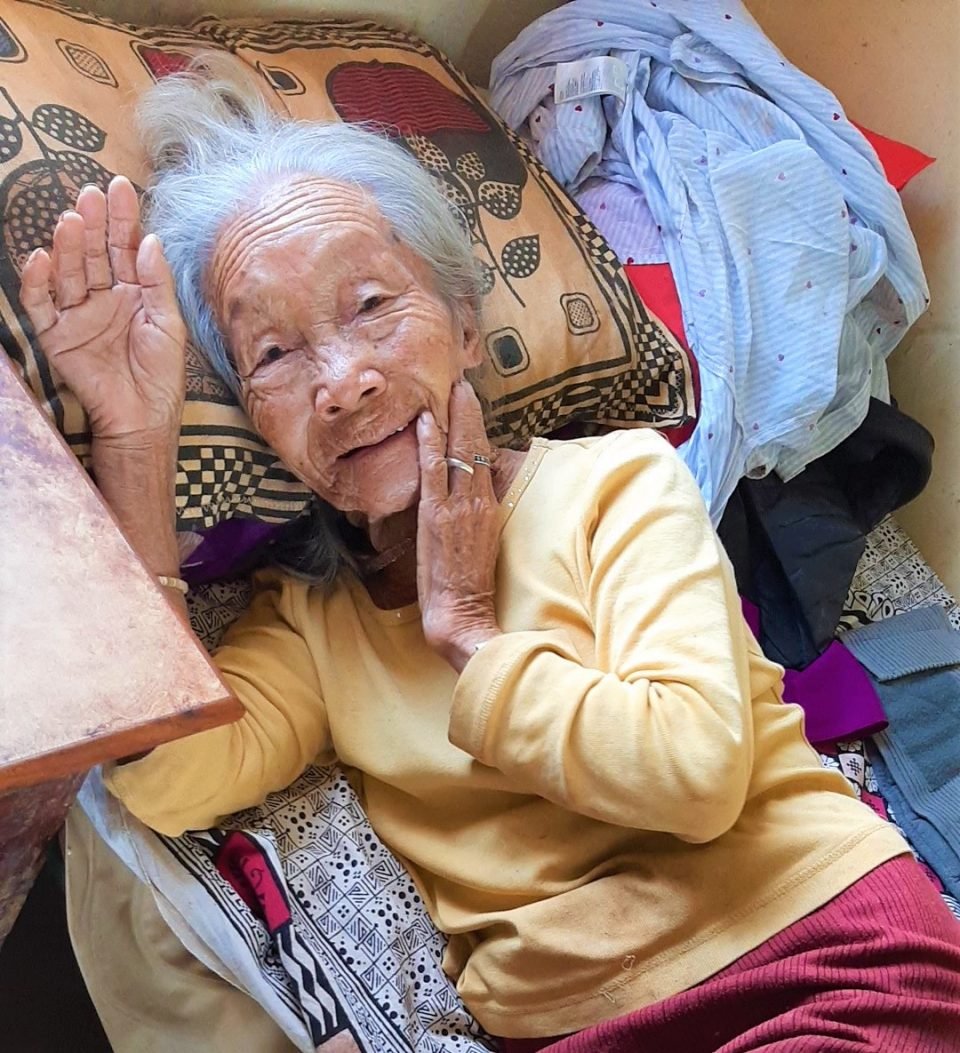
An elder of Dhondenling Old People Home, Kollegal.
Since 2015, the FPMT Social Services Fund has been offering support to hundreds of Tibetan elders residing in elderly homes throughout India. Tibetans have been living in exile since 1959 when Communist China invaded Tibet, forcing 100,000 Tibetans to flee to India, Nepal, Bhutan and eventually elsewhere around the world. Many of the Tibetan refugees in India and Nepal are now elderly and many are rendered destitute and in desperate need of care at this critical phase of life. Tibetan families traditionally provide for the elderly and sick among them. However, when a family itself is in deep poverty, or if the elderly individual is alone and without family support, help is needed.
Lama Zopa Rinpoche has encouraged us to not only address residents’ material needs such as food and shelter, but also their spiritual ones. With this in mind, we’ve also sponsored holy objects such as stupas and prayer wheels on the premises of some of these homes as well, encouraged the recitation of sutras and mantras, and provided grants to ensure the elders have adequate and appropriate space for Dharma practice and merit-making group activities.
In 2021 we sent US$286,887.28 to support seven elderly homes in India. Please join us in rejoicing that these grants were used in the following ways:
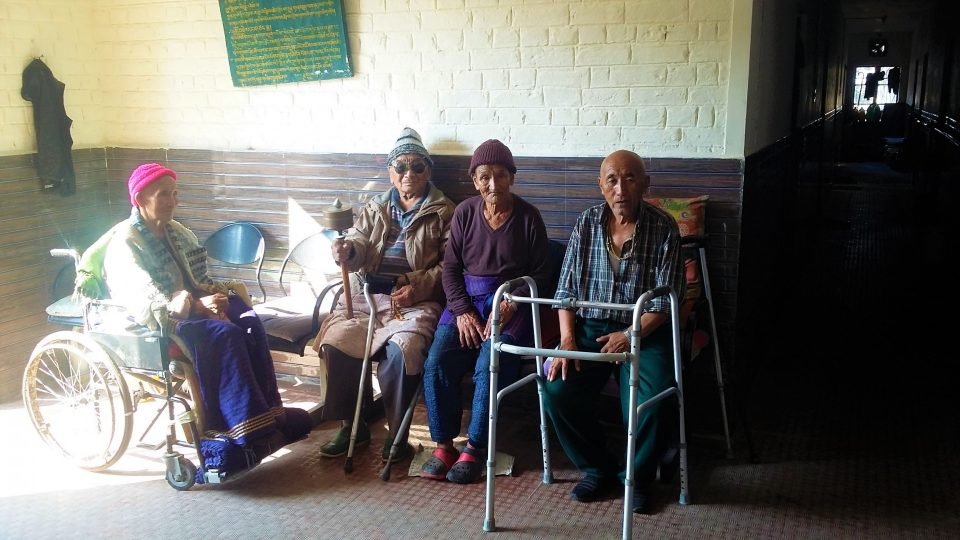
Elders of Jampaling Elder’s Home, Dharamsala.
Elderly Homes Supported in 2021
Jampaling Elder’s Home, Dharamsala, provides food, shelter and medical services to 156 residents. US$13,914 was offered for shortfall of their 2021 operating budget.
Lugsam Samduling Home for the Aged and Disabled, Bylakuppe, looks after 46 elderly individuals who are living in extremely modest conditions, many with health issues due to the advanced age. US$39,354.65 total was offered to this home to cover budget shortfall for 2021 and for an ambulance for the settlement’s hospital, Tsojhe Khangsar Hospital. This ambulance will be used by the people of two Tibetan Settlements and there are around 20,000 people, including Himalayan monks and nuns, residing in the various monasteries.
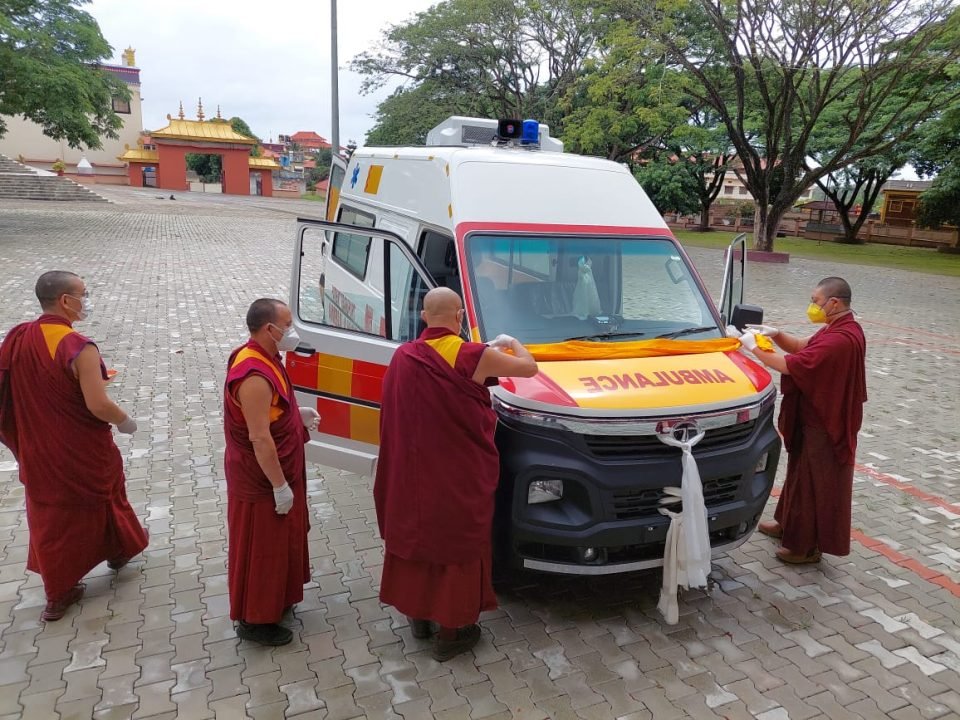
Sera Je monks consecrating new ambulance sponsored for Tsojhe Khangsar Hospital.
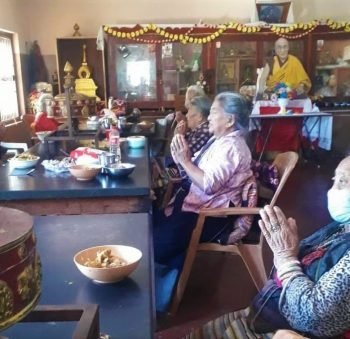
Elders of Dhondenling having morning prayer before breakfast.
Doeguling Home for Elderly and Disabled, located in the Doeguling Tibetan Refugee Settlement in Mundgod, cares for 103 elderly residents. US$41,745 was offered for food, medical expenses, and an investment into the corpus fund which contributes to the sustainability of the home.
Dhondenling Old People Home, Kollegal, is in one of the most remote and underdeveloped Tibetan settlements in southern India. The elderly home has a capacity for 32 elderly Tibetans residents. US$28,314.63 was offered to cover 70% of their annual operating budget and a separate grant from Buddha Union of Italy of US$48,628.87 was offered for the final costs of community hall that is being built.
Rabgayling Tibetan Family Welfare Association, Hunsur, has an elderly home serving 20 residents. US$25,813.33 was offered this year for their medical fund and recurring expenses.
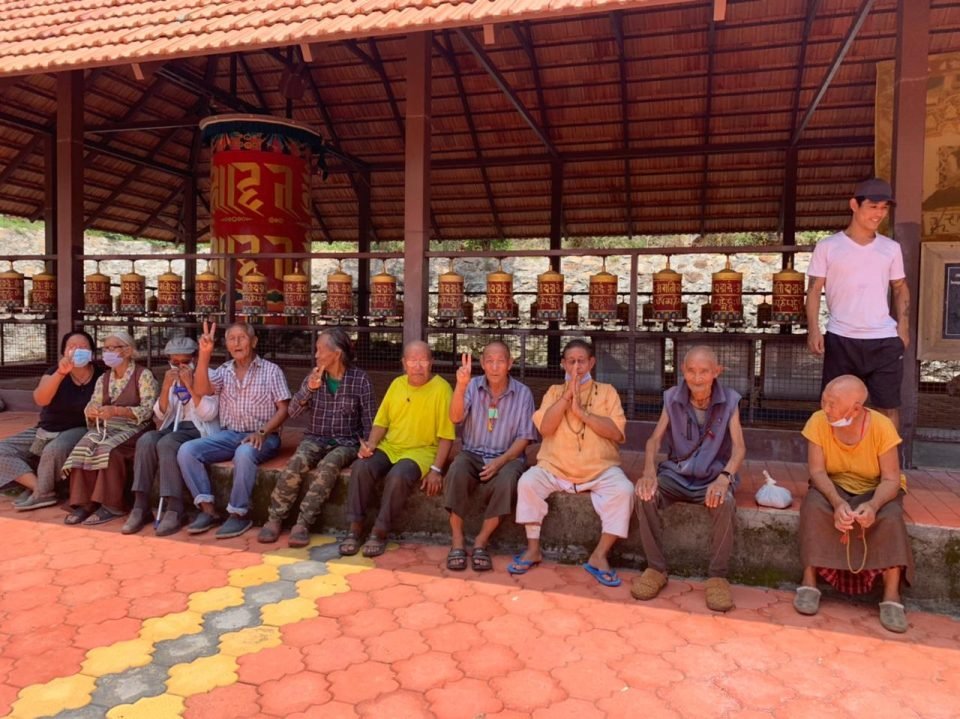
Elders of Rabgayling Tibetan Family Welfare Association home in front of prayer wheels.
Chauntra Dhonden Old People’s Home, Bir. US$69,570 was offered this year for installation of new metal roofing sheets and repair and maintenance. This home home cares for 24 elders and the support was requested on behalf of the Tibetan government and this was our first year supporting this home.
Old People’s Home Odisha Phuntsokling Settlement, Orissa, is a home caring for 19 Tibetan elders. There are also five monasteries on this settlement as well as two primary schools, one middle school, and a nursery for babies. US$19,546.80 was offered for their annual budget which they desperately needed after losing their main sponsor of ten years. This is our first year supporting this home.
The Social Services Fund also provides charitable giving to children, the sick, and the very poor through a variety of grants every year.
Thank you to all the donors who make this most urgent and critical support for Tibetan elders possible.
All are welcome to support the Social Services Fund and help ensure we can offer direct support to the elderly.
22
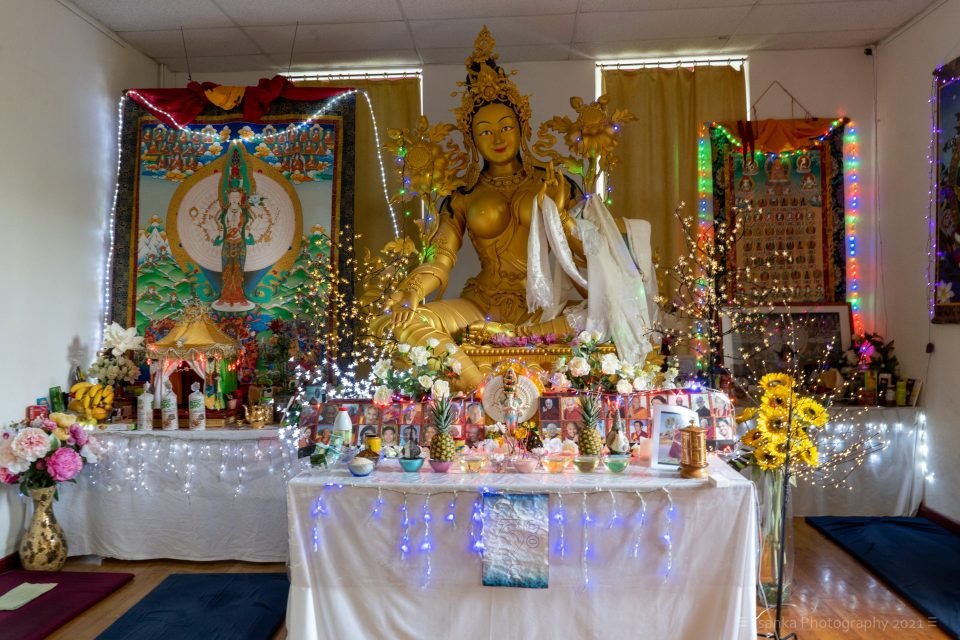
Beautiful Nyung-na altar at Institut Vajra Yogini, France.
By Nicolas Brun
One of Lama Zopa Rinpoche’s Vast Visions for the FPMT organization is to sponsor 1,000 Nyung-Na Retreats. In response to Rinpoche’s vision, Institut Vajra Yogini (IVY) has been hosting the TENTH 108 Nyung-Na Retreat and has now started to plan the eleventh set of 108 nyung-nas, from November 12, 2021 to mid-June 2022.
This year, following the COVID-19 crisis, the center had to face a really big challenge as the Nyung-Na Retreat was becoming more attractive for people. Before the pandemic, sessions could attract 20-25 people as one had the possibility to come and practice for a session. Unfortunately, the external conditions forced us to announce the end of this possibility because of the safety measures decided by the government.
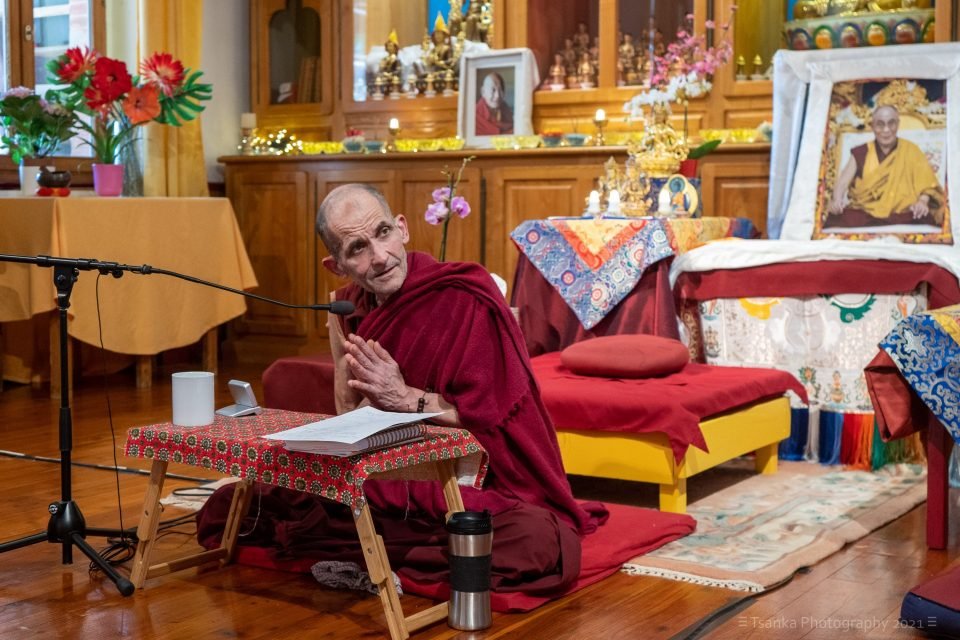
Ven. Charles leading tenth 108 Nyung-na Retreat at Institut Vajra Yogini.
Because it was impossible to us the completely stop the retreat, all the team decided to keep some of the retreatants in a safe place and include them in the lockdown organization of IVY. Five long-term nyung-na retreatants have been able to stay and keep going three sessions a day, dedicating their practice for all of us and for all beings. We’ve also requested this year Ven. Charles allow us to broadcast some sessions online so that every morning people could join the first session, and do one complete nyung-na every month at a distance.
The Nyung-Na Retreat is an intensive practice that carries great blessings and is highly praised by Lama Zopa Rinpoche as a supreme method for transforming the mind. The practice includes taking the 24-hour Mahayana precepts every day, with the addition of complete fasting and silence every second day. One does four 2.5 hour sessions of well-structured practice that includes meditation, prostrations, and mantra recitation each day. It is a powerfully effective experiential practice that can be done by anyone with respect and faith for the practice.
These nyung-nas will be led in French but people can follow simultaneously in English or other languages.
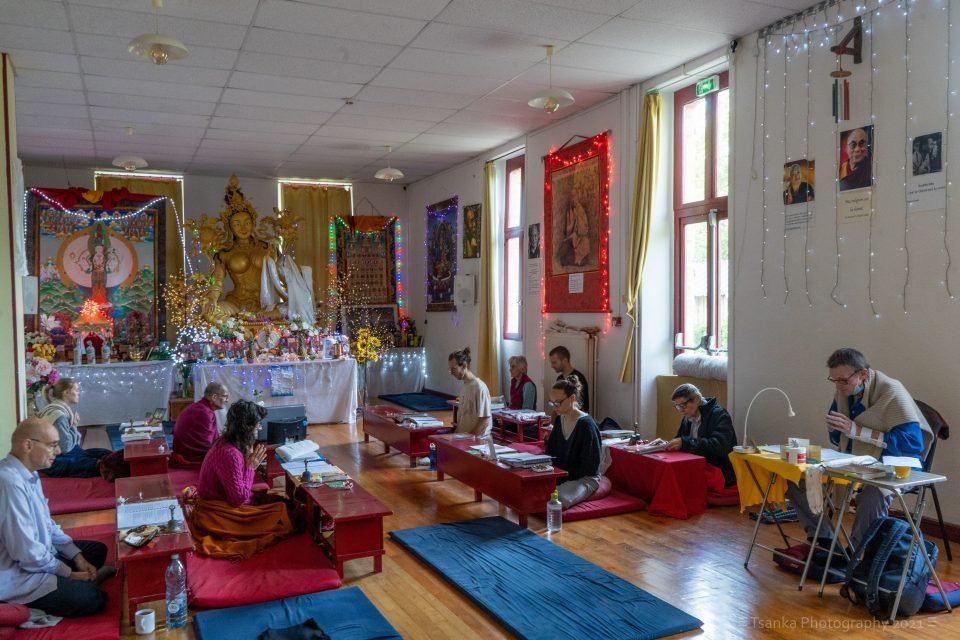
2021 participants in the 108 Nyung-na retreat at Institut Vajra Yogini.
Everybody is welcome to join for one or more nyung-nas. You can contact Institute Vajra Yogini to enter any number of these retreats (1-100) when they begin the next set. Contributing to the sponsorship of these retreats or completing one or more yourself is directly contributing to Rinpoche’s wishes.
Nicolas Brun is the Director of Institut Vajra Yogini, France.
A Practice to Open the Heart
As always, participants were moved by this challenging and sincere practice of nyung-na at Institut Vajra Yogini. One retreatant commented, “[Nyung-Na] requires a lot of commitment, discipline, and acceptance of suffering, but for this reason it also allows you to work on several levels.” Another reflected, “It is very special to go on this insightful and heart-opening journey to the many different corners of one’s mind, while being in a space full of kindness and care and with beloved Ven. Charles as a guide and example, who has the capacity to touch the hearts of every participant like a loving mother taking care of all her children equally.” One grateful participant gratefully shared, “Finally a retreat that has meaning for me! I really feel my heart opening for sentient beings.”
“Nyung-Nas are a most powerful, most beneficial and quickest way for you to develop bodhicitta, to collect extensive merit to quickly achieve enlightenment, to become Chenrezig, to liberate sentient beings from the oceans of samsara suffering and bring to enlightenment….This is an extremely powerful practice, it in an incredible way to develop bodhichitta.” —Lama Zopa Rinpoche
Lama Zopa Rinpoche, through the Lama Zopa Rinpoche Bodhichitta Fund. has been sponsoring the food and accommodation for up to ten people, each year, who undertake this retreat, and for the tenth 108 Nyung-Na Retreat at IVY US$7,315.38 was offered for the first half of the retreat. The next set of 108 nyung-nas is scheduled to begin on November 12, 2021. Lama Zopa Rinpoche is again offering sponsorship for up to ten people to commit to 100 nyung-nas.
You can learn more about the Lama Zopa Rinpoche Bodhichitta Fund as well as the other Charitable Projects of FPMT.
14
Continued Support to Prisoners Wishing to Study Dharma
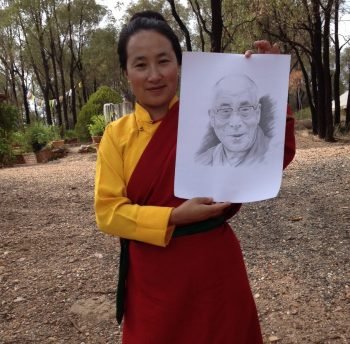
Khadro-la at Thubten Shedrup Ling Monastery with a drawing of His Holiness the Dalai Lama by one of LPPA (Australia) students. Photo courtesy of Liberation Prison Project.
Liberation Prison Project (LPP) is an FPMT international project founded in 1996 dedicated to supporting students around the world in prison who wish to study Dharma. Since its inception, LPP has helped thousands of prisoners worldwide study Buddha’s teachings and develop a sincere practice of Buddhism.
Over the years, LPP has offered hundreds of free subscriptions of Mandala to prisoners. This had been made possible due to the kindness of a benefactor, through Friends of FPMT who donated their subscriptions to prisoners, and through grants from the International Merit Box Fund. Most recently we were delighted to offer a grant from the Education and Preservation Fund to LPP in 2020 so that the teachings and articles in Mandala will continue to reach prisoner-students interested in exploring Buddhism via FPMT. As Mandala is no longer a print magazine and all content is being published online, LPP is now looking at ways to print either the complete magazine or selected articles and distribute them freely to those in prison who have committed to their Dharma practice.
Director Ven. Thubten Chokyi reports, “LPP will use the grant funds to print and distribute Mandala to LPP students. A lot of our time so far this year has been on distributing the Enjoy Life Liberated from Prison book, Liberation calendar and the higher demand for resources we get from prisoners typically in the first few months of the year.” Depending on the final costs for printing and mailing, LPP will determine how many copies of Mandala they will be able to send and how long this latest grant will last for this purpose.
Enjoy Life Liberated from the Inner Prison has been published as a fundraiser for Liberation Prison Project. This book is comprised of years of letters of advice Lama Zopa Rinpoche has given to prisoners on how to use their time in prison in the most meaningful way—to bring them to enlightenment.
Community Service, such as that provided by the Liberation Prison Project, is one of FPMT’s Five Pillars of Service.
Thanks to all who support the FPMT Education and Preservation Fund which enables grants like this to continue for the benefit of sincere practitioners wishing to enrich their Dharma education.
4
Tibetan Elders Creating Merit in Elderly Homes in India
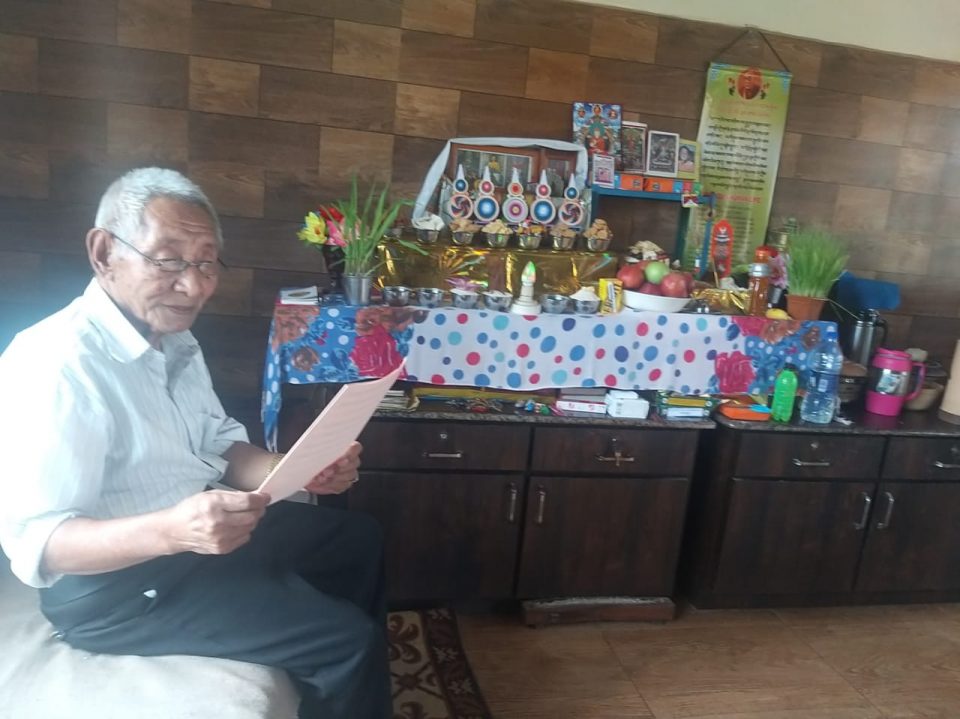
A Tibetan elder from Lugsum Sanduling, Bylakuppe, reciting the Diamond Cutter Sutra on Lama Zopa Rinpoche’s advice.
Advice for the Elderly
Lama Zopa Rinpoche recently offered extensive advice on different ways to help and benefit the elderly, particularly Tibetans in Nepal and India, who are Buddhist. Rinpoche has made the point that as Buddhists we shouldn’t only give charity of food and shelter to the elderly—we also can offer Dharma to them as well. In this recent teaching, Rinpoche mentioned the importance of using the time when one is in an elderly home to create merit and purify as much as possible, for example by listening to Dharma teachings and reciting sutras. Rinpoche explained the importance of displaying certain mantras and images of holy objects, buddhas, deities, and Buddha pure lands so the elders can look at beautiful images and pray to be reborn there.
Rinpoche also composed a text for the elders to recite, similar to the Method to Transform daily motivation practice.
Dhondenling Tibetan Settlement, located in Kollegal, India, is the most remote and underdeveloped Tibetan settlements in southern India. The settlement consists of twenty-two villages, and an elderly home. The elderly home has a capacity for thirty-two elderly Tibetans residents which FPMT Charitable Projects has been supporting since 2015. Rinpoche requested that the elders recite the Vajra Cutter Sutra regularly and also, from time to time, to receive Dharma teachings. After receiving this advice they immediately arranged for two weeks of teachings on the Vajra Cutter Sutra from a qualified teacher. This advice was also shared with Lugsum Samduling Home for the Aged and Disabled, a home in Bylakuppe, India, which cares for thirty-seven aging Tibetans. They were very happy to receive this personal advice from Rinpoche and sent photos and videos of the elders reciting the sutra and also receiving teachings and the oral transmission of the sutra.
Please enjoy this video of the elders of Lugsum Samduling reciting the Vajra Cutter Sutra:
https://www.youtube.com/watch?v=snLBD48GRlM
Rinpoche always advises elderly homes and hospices to have beautifully framed holy images at the facility so the elders can always see them and create merit. Rinpoche also suggests to always display Namgyalma mantras in every room so that even mosquitoes, ants, and insects get purified while they are in that particular room. In addition, to have an image of the deity Amoghapasha for the people in the home. Seeing this deity purifies the five heavy negative karmas without break and the negative karma of abandoning holy Dharma. Rinpoche also advises having thangkas of different pure lands, so—depending on the pure land you have an affinity for—one can look at that particular image of the pure land and make prayers to be reborn there. Rinpoche also has explained the benefits of playing mantras, sutras, and Dharma teachings, and if possible to go around holy objects or turn prayer wheels. All of these activities leave positive imprints on the mind and this is so important, especially when one is close to passing.
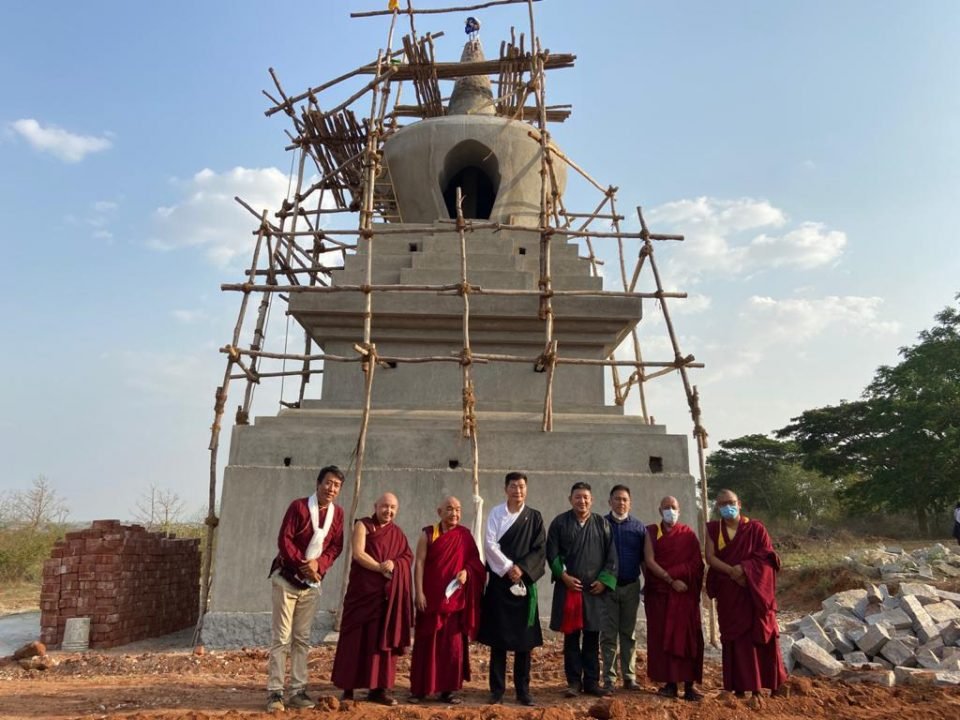
President of Tibet, Sikyong Dr. Lobsang Sangay, with others in front of the stupa being built in Hunsur.
For six years, FPMT Charitable Projects has been supporting Rabgayling Old Aged Home in Hunsur, India, which is part of the Rabagayling Tibetan Settlement and serves twenty elderly residents. Over several years, funds have been offered for daily food for the residents, for the annual operating costs of the elderly home, the building of accommodation for the residents, medical needs, and a community hall. Most recently, a 35-foot stupa has been sponsored near the elderly home on the settlement. This stupa is being built for the all the people in the Tibetan settlement, but in particular for the elders, as it is close to the elderly home and they can circumambulate it without much difficulty. This is an easy way for the elders to collect merit and purify negative karma by going around the hold object. Recently the previous President of Tibet, Sikyong Dr. Lobsang Sangay, visited the stupa.
Advice for Those Who are Dying
Rinpoche has also offered extensive advice for those who are dying or have recently died including how to make the environment very beautiful and uplifting so that people can enjoy and not feel depressed as well as general advice for what thangkas, mantras, prayers, or books are most beneficial.
Please rejoice in the various ways we are offering direct support to elders, such as completely covering or helping with the annual expenses for a number of elderly homes in India, and also how Rinpoche is helping with offering advice for ultimate support, such as inspiring the elders to use their time creating merit and offering advice on how to help at the time of passing.
Lama Zopa Rinpoche offered details about the recent advice he offered to Tibetan elderly in the thought transformation teaching “Some Ways in Which Rinpoche is Benefitting People.”
All are welcome to support the Social Services Fund and help ensure we can offer direct support to the elderly.
- Tagged: advice for death and dying, elderly, elderly homes, hospices, social services fund, tibetan elderly
27
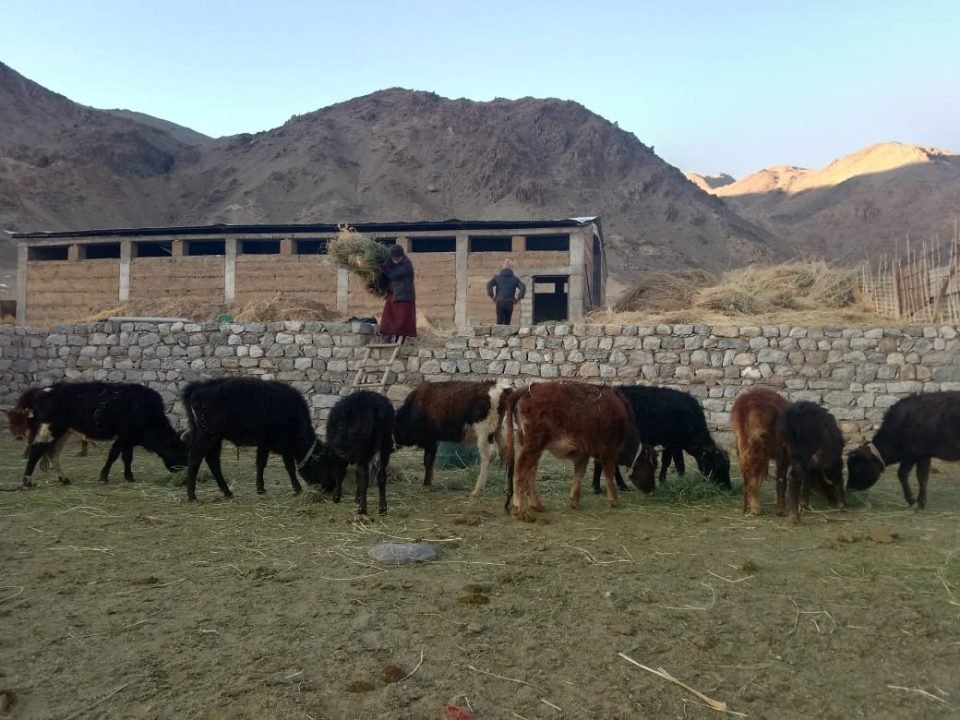
Cows being cared for by Taru Gayphel Tsogspa Animal Welfare Society.
Taru Gayphel Tsogspa Animal Welfare Society is an animal care facility located in Taru, Leh, Ladakh. Tsering Dorjay Malik first developed the idea in 2013 to help the animals in the village by drawing inspiration from Buddha’s teachings that every living being has Buddha nature and is deserving of care and kindness.
In the village, abandoned donkeys, cows, and other farm animals were running around loose, many of whom were victims of road accidents or could not find the necessary resources to survive. Taru Gayphel Tsogspa Animal Welfare Society started by rescuing these animals, offering care, and feeding them. In the beginning there were many challenges due to there not being enough food, shelter, and medicine for the animals. Slowly, concerned animal lovers in the area began supporting this project, but even with this interest, and also due to the increasing numbers of animals needing care, the available resources were exhausted and it was not possible to accept more animals.
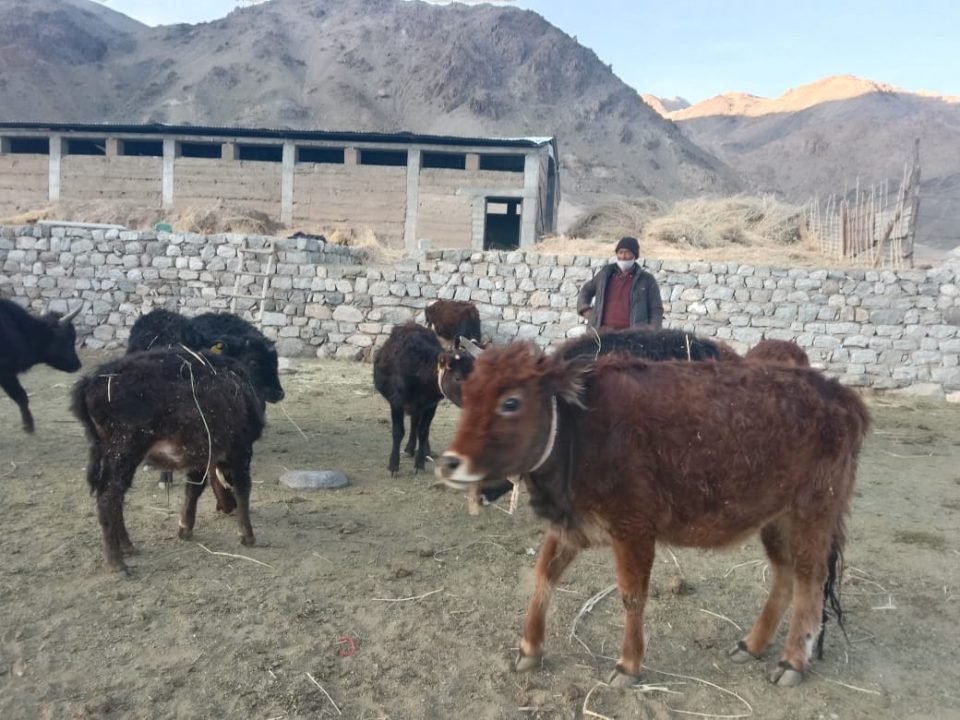
Cows of the Taru Gayphel Tsogspa Animal Welfare Society.
Currently there are fifty bulls, twenty cows, ten sheep, and five donkeys being cared for at Taru Gayphel Tsogspa Animal Welfare Society, many of these animals have been saved from death and now are able to live the rest of their lives for on the land.
Thanks to the kindness of a generous donor, the Animal Liberation Fund recently offered a grant of US$20,000 for the continual care of all the animals at the facility including for food, medicine, and shelter; and for upkeep of the premises. Some of these funds will also be used for essential needs such as:
- Building ten new animal sheds
- Compound walls for the center which is nearly 54,000 square feet
- Staff accommodation on the premises and salaries for four caretakers
- Medical care for sick and injured animals
- Food for all the animals (the total for this alone is US$59,000 a year)
Thank you to all the kind donors of the Animal Liberation Fund and the Stupa Fund who enabled us to make these grants, and benefit over 100 animals.
All are welcome to support the Animal Liberation Fund and Stupa Fund and help ensure beneficial grants like this can continue.
- Tagged: animal care, animal liberation fund, animal rescue, animals, social services fund, stupa fund
20
Through the FPMT Puja Fund we have arranged for an incredible vast array of pujas, practices, and offerings for Saka Dawa May 26 when any merit created is multiplied 100 million times.
The pujas and offerings are being undertaken with strong prayers by up to 10,000 Sangha and every practice is extensively dedicated to all the donors of the puja fund, and in particular for all those affected by the pandemic. By contributing any amount to the Puja Fund, not only will you be a part of all these prayers and practices but also every single puja arranged throughout the year, will be dedicated to you.
“If you make offerings, please remember on the actual day that the pujas are happening, rejoice in them and dedicate the merit. This is the best business and the best way to create most extensive merit.” – Lama Zopa Rinpoche
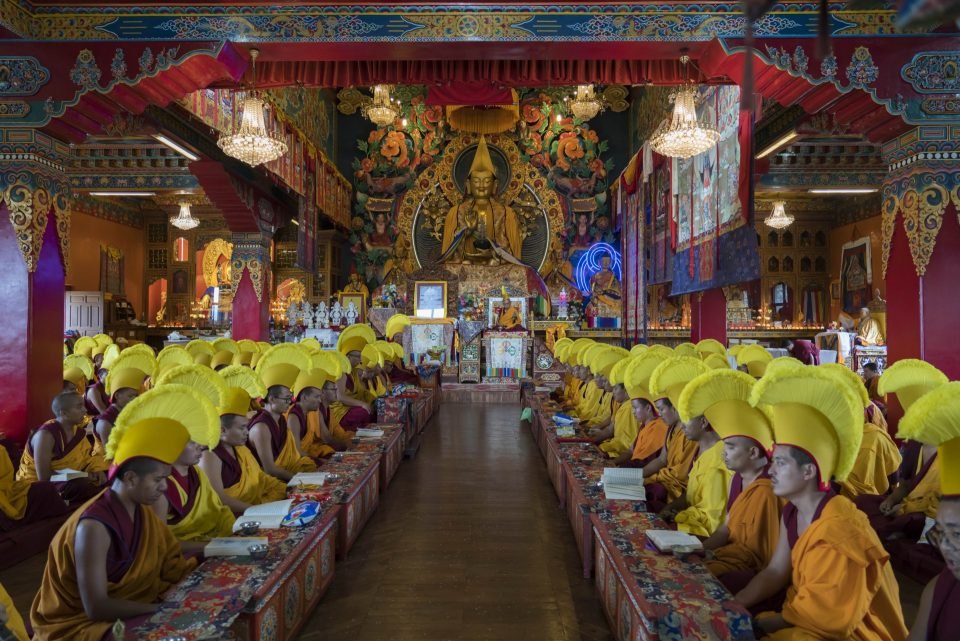
Monks at Kopan Monastery engaging in puja.
Some of the prayers, pujas, and offerings happening on Saka Dawa*:
- Recitation of the Prajnaparamita.
- 100,000 Praises to Twenty-one Taras offered three times by over 9,000 ordained monks and nuns.
- One thousand sets of offerings to Buddha Namgyalma, Namgyalma long life ritual, Medicine Buddha puja and Sixty-four Offerings to Kalarupa.
- One Hundred Million Mani Retreat by Tashi Chime Gatsal Nunnery in Nepal.
- Offerings are made to His Holiness the Dalai Lama and all of Rinpoche’s gurus and to over 10,000 ordained Sangha around the world.
- Offering paint, gold, and new robes to stupas in Nepal, and Buddha statue in BodhGaya and Jowo Buddha statue in Tibet.
-
See the complete list of all the pujas, practices and offerings that will be happening on Saka Dawa.

The nuns of of Kachoe Gyakyil Nunnery, Nepal, offering puja.
Thank you to all the donors who make it possible to arrange these continual pujas, prayers, and offerings.
*We are closely monitoring the most current COVID-19 restrictions and will adjust the practices and pujas offered on Saka Dawa according to the safety of all.
You can learn more about the beneficial prayers, practices, and pujas sponsored by the Puja Fund, or about FPMT’s other extensive charitable activity.
- Tagged: fpmt puja fund, puja fund, saka dawa
14
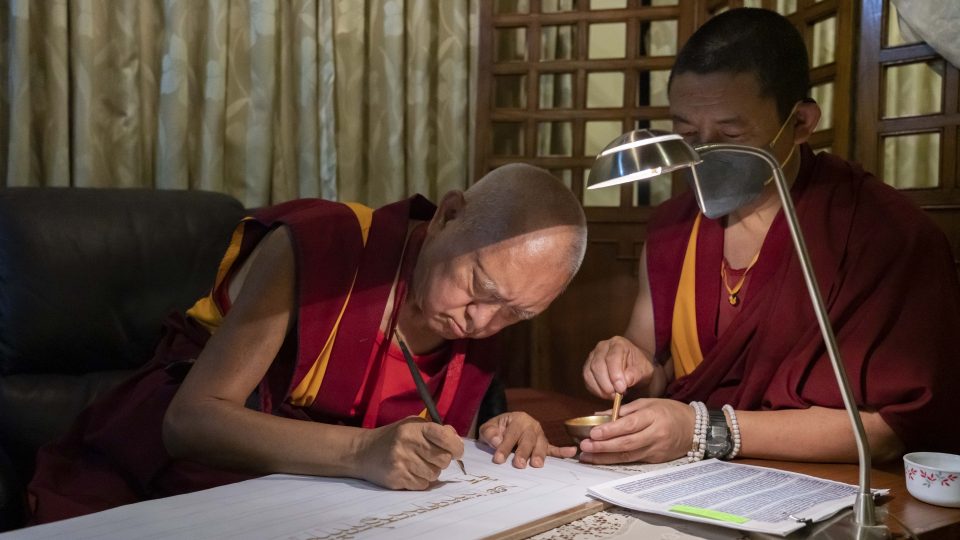
Lama Zopa Rinpoche writing out the Prajnaparamita for the first time in ten years with the help of Ven. Tsering, Nepal. May 2021, photo by Ven. Lobsang Sherab.
Lama Zopa Rinpoche had been writing the 8,000 verse Prajnaparamita Sutra in pure gold for several years, but since 2011 Rinpoche hasn’t been able to write, as Rinpoche felt his handwriting was not stable enough, since manifesting a stroke that year. Rinpoche has explained how important it is to write in one’s best calligraphy, due to the incredibly precious text that one is writing out. Under Rinpoche’s guidance several students have been writing out the Prajnaparamita on archival quality rainbow paper including Ven. Tsering, who is now based at Kopan Monastery, and is writing out volumes from the 12,000 verse Prajnaparamita in pure gold full-time, as well as Jane Seidlitz in US, and Ven. Nina at Khachoe Ghakyil Ling Nunnery.
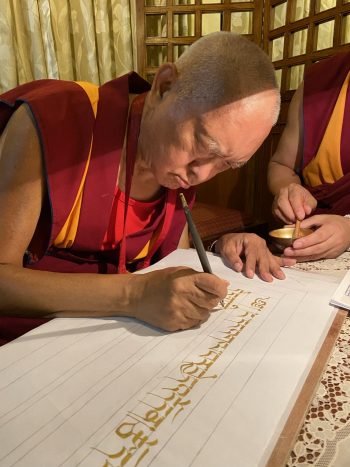
Lama Zopa Rinpoche writing out the Prajnaparamita, Nepal. May 2021, photo by Ven. Lobsang Sherab.
Unbelievably, Rinpoche has started writing out the Prajnaparamita again! Please join us in rejoicing that Rinpoche is able to do this and Ven. Tsering is helping him.
As Rinpoche has explained:
Even writing one letter from Prajnaparamita, even writing one letter, one syllable, the benefits are unbelievable, unbelievable, more than making extensive offerings, skies of extensive offerings to all the buddhas, so many eons, the merits you collect are unbelievable.
Offering one grain of rice or a tiny flower to a picture of the Buddha, statue of the Buddha, small or big, the benefits is that it brings you up to enlightenment and then you are able to free numberless sentient beings from oceans of samsaric sufferings and bring everyone to enlightenment. Just by making skies of offerings to numberless buddhas for eons.
Now here writing one word of Prajnaparamita, the teachings of emptiness, you create far greater merit than making that many offerings, skies of offerings to numberless buddhas for so many eons.
Thank you to all the kind donors of the Prajnaparamita Project, which covers the cost of gold, paper, and calligraphy pens.
You can learn more about the Prajnaparamita Project as well as the other Charitable Projects of FPMT.
- Tagged: prajnaparamita, prajnaparamita project
4
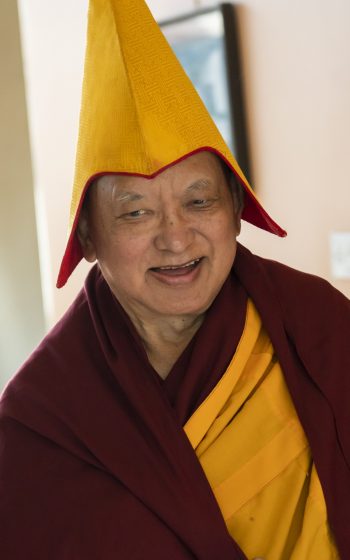
Lama Zopa Rinpoche during the long life puja offered to him on April 19, 2021, at Kopan Monastery. Photo by Ven. Lobsang Sherab.
Please join the entire FPMT community by rejoicing in the recent long life puja which was offered to Lama Zopa Rinpoche at Kopan Monastery, Nepal, on behalf of FPMT centers, projects, services, study groups, and students on April 19.
This was the second of the official annual long life pujas organized in accordance with the advice of Khadro-la (Rangjung Neljorma Khadro Namsel Drönme).
This was a White Tara Long Life Puja and was preceded by seven days of practices led by Khadro-la and Kopan Lama Gyupas and senior monks and nuns.
The long life puja is an important offering ceremony for purifying mistakes that occur in relation to one’s teacher and to creates the causes and conditions to continue to receive benefit from that teacher for a very long time. For this reason, the FPMT organizes at least one official long life puja for Rinpoche every year. Long life practices also create the cause for one’s own long life.
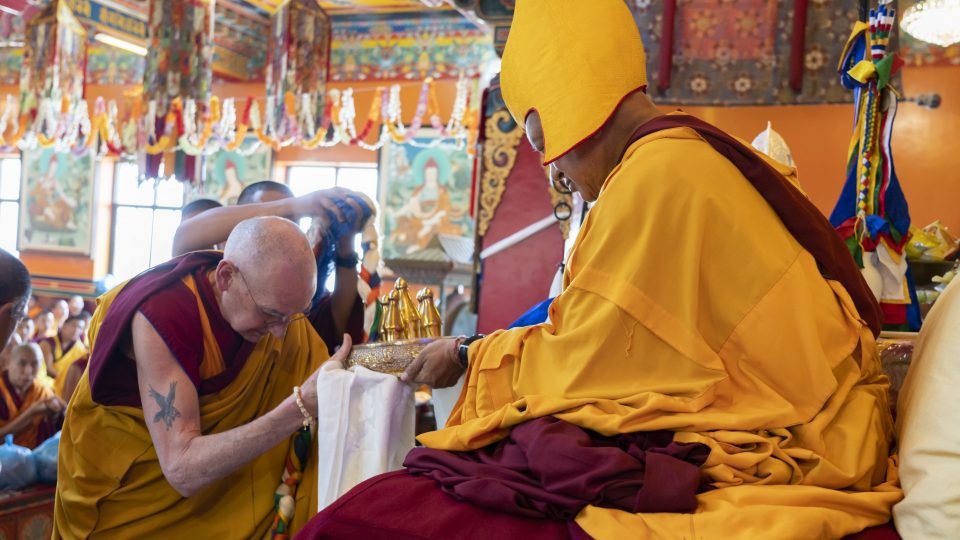
Ven. Roger Kunsang offering a mandala to Lama Zopa Rinpoche during the April 19 long life puja at Kopan Monastery. Photo by Ven. Lobsang Sherab.
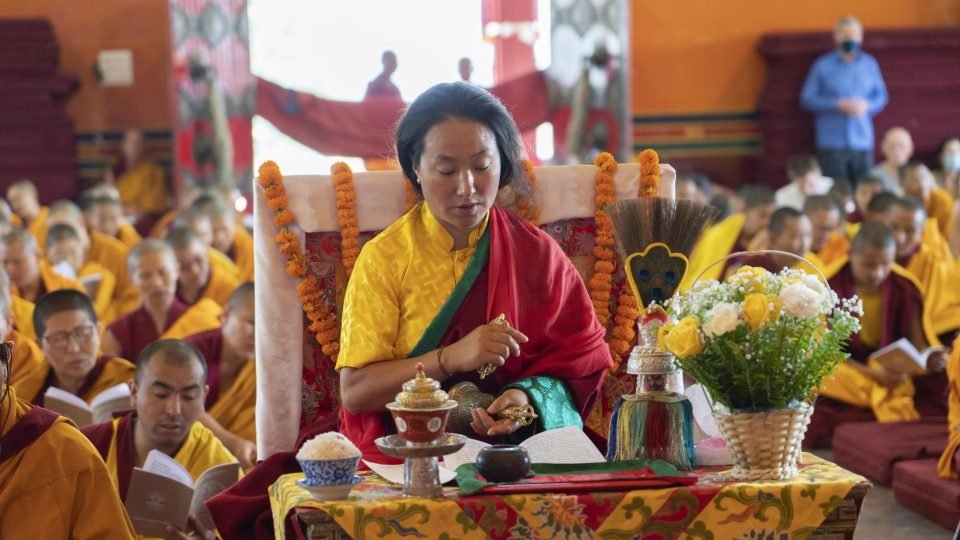
Khadro-la participating in the April 19 long life puja for Lama Zopa Rinpoche at Kopan Monastery. Photo by Ven. Lobsang Sherab.
We are delighted to share this video (youtu.be/c0qhiGPf1do) of Rinpoche from the long life puja on April 19. In this 46 minute clip, Rinpoche is offering advice to all FPMT students and centers in English and thanking those who participated in the long life puja including everyone offering service to FPMT. During this advice and thanks Rinpoche shares the following in honor of Lama Yeshe at 22:42 in this video:
“Who started the organization is Lama Yeshe, most rare and difficult to mention the holy name. He started the organization in Dharamsala, Tushita. I think we did fulfill Lama Yeshe’s wishes. The whole organization from year to year to year, development was so hard. It came up gradually, like an airplane taking off, very slowly—it developed like that. We did fulfill Lama’s wishes, not only studying lamrim but Masters Program, Basic Program, all of that—so we really did fulfill Lama Yeshe’s wishes as an organization. And also by serving His Holiness the Dalai Lama, this is so good, and this is the quality of the organization.”
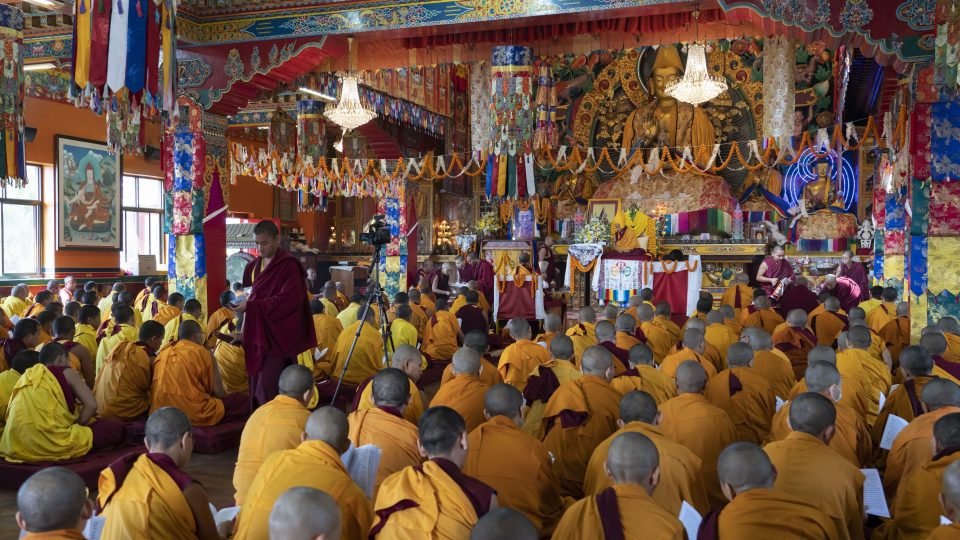
Participants during the long life puja offered to Lama Zopa Rinpoche on April 19 at Kopan Monastery.
We offer thanks to all who contributed to the Long Life Puja Fund, those who offered prayers at the time of the puja, and those who rejoiced that this puja has happened—all of this collective good energy and intention contributes to creating the cause for Lama Zopa Rinpoche to be among us for a long time.
“To understand why a long life puja is essential, we must understand the value of the Guru. He is our guide in this life, the bardo, and future lives. He is immensely important. It is not a case where if we ask him to live he will, and vice-versa, but that to offer such a ceremony purifies our own broken samayas.” —Geshe Lama Konchog
You can see more photos of this special White Tara Long Life Puja in the most recent photo gallery of Lama Zopa Rinpoche’s activities:
fpmt.org/teachers/zopa/gallery/nepal-march-april-2021
The Long Life Puja Fund always contributes to long life pujas offered to Lama Zopa Rinpoche. You can also learn about the many Charitable Projects of FPMT and discover the many ways the various funds and projects are benefiting others.
- Tagged: kopan monastery, lama zopa rinpoche long life puja, lama zopa rinpoche long life puja fund, long life puja
23
Important Update on the Maitreya Project in Bodhgaya
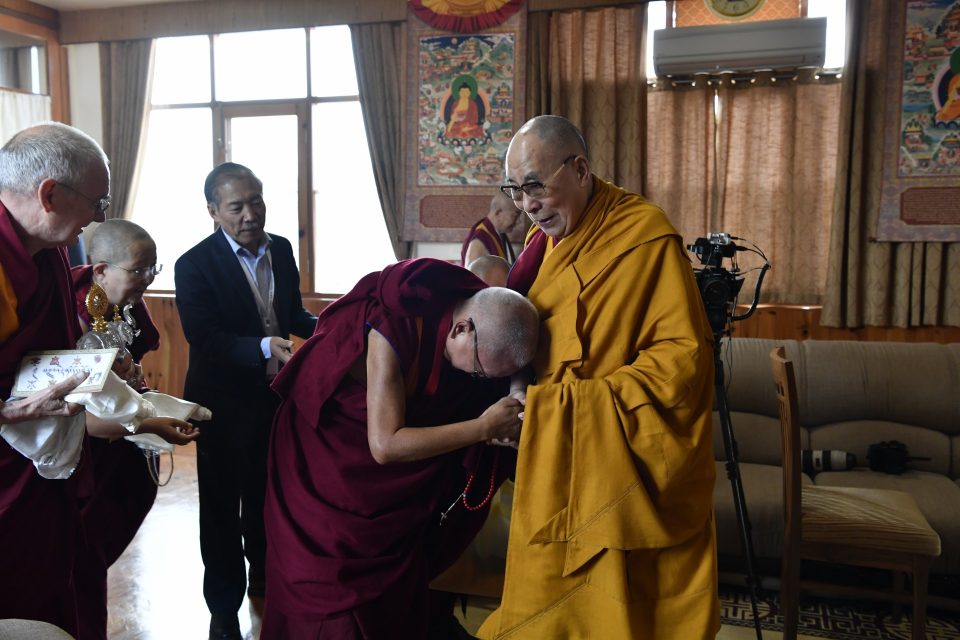
Lama Zopa Rinpoche meeting His Holiness the Dalai Lama in Bodhgaya, January 2020. Photo courtesy of the Office of His Holiness the Dalai Lama.
The creation of Holy Objects for World Peace is an important aspect of Lama Zopa Rinpoche’s vast vision for the FPMT organization. Specifically, Rinpoche envisions the creation of many statues of Maitreya Buddha around the world. Currently, there are two separate FPMT projects to build very large Maitreya Buddha statues in India. One based is in Bodhgaya, Bihar, and one based in Kushinagar, Uttar Pradesh.
Ven. Roger Kunsang’s CEO letter for this year’s Annual Review was a concise overview of a challenging yet beneficial year for FPMT International Office and the whole FPMT organization. In this letter he shared an important update about the Maitreya Project land in Bodhgaya. We are pleased to share this update with you.
Another major highlight for 2020 is that Lama Zopa Rinpoche could finalize the offering of the Maitreya Project land in Bodhgaya to His Holiness the Dalai Lama. This is an amazing offering and an incredible achievement for the organization that we can all rejoice in!
The donation of about thirty acres (twelve hectares) of valuable, prime land in Bodhgaya will help fulfill His Holiness’s wish to build an international institute in this most sacred place of Buddhism. His Holiness’s vision is that the institute will share the wisdom of the Nalanda tradition in order to create happiness and peace in the world. The project includes three aspects:
- To create a learning center for studying philosophy of the mind; emotional health; as well as methodology, etymology dialects, and meditation as embodied by Nalanda masters.
- To build a replica of the ancient Nalanda University to connect with Buddhists around the world and bring the world into the “ecosystem” of Bodhgaya.
- To promote the four principal commitments of His Holiness the Dalai Lama, inspired by the Nalanda tradition.
The plan to build a large Maitreya statue at this site has been integrated into the overall vision for His Holiness’s institute. FPMT will continue to sponsor the statue.
Sikyong Lobsang Sangay, the president of the Tibetan government in exile, wrote to me recently, thanking FPMT for the offering of the Maitreya Project land:
“I would like to sincerely express my gratitude to FPMT for offering land to His Holiness the Dalai Lama through the Nalanda Institute of Dalai Lama at Bodhgaya. The institute, as envisioned by His Holiness, will be a secular international institution that will preserve and promote India’s ancient wisdom that flourished at Nalanda University.
“The land offered by FPMT to His Holiness will be specifically used by the institute to provide an opportunity for people from around the world to study His Holiness’s philosophy and vision. The land will host seven core structures, which are the Maitreya statue, a temple, a museum, an international Buddhist library, a meditation center, classrooms, and a state of the art convention hall.”
In January 2020, Rinpoche had an appointment with His Holiness seeking advice on other matters. During the meeting, His Holiness expressed gratitude for the offered land and also for the role Lama Yeshe and Lama Zopa Rinpoche have played in establishing the Gelug tradition in the West. His Holiness also praised Rinpoche’s generosity and other qualities as well as the work of the FPMT organization.
What Rinpoche has offered to His Holiness is something that helps to actualize a strong wish of His Holiness. As Rinpoche has taught, fulfilling the wishes of the guru is the most enjoyable thing in life. When Rinpoche told Khadro-la (Rangjung Neljorma Khadro Namsel Drönme) about the donation, she said that offering land to His Holiness for the institute is far more beneficial than building thousands of Maitreya statues. (Of course, we are still going to build Maitreya statues.)
So please rejoice in the merit created by the donation of Maitreya Project land to His Holiness. And also rejoice in the merit generated by all those who have helped with and donated to the Maitreya Project in Bodhgaya over the years. This generosity has created the conditions for Rinpoche’s amazing offering to His Holiness—all of this fulfilling the wishes of our gurus!
You can read Ven. Roger’s full CEO letter in this year’s Annual Review which includes many important and inspiring updates from 2020.
You can read about the many beneficial grants offered through the various funds of FPMT Charitable Projects in this year’s Annual Review.
If you would like to contribute to the building of holy objects around the world, you are welcome to offer any amount to the Holy Objects Fund which contributes to the creation of stupas, prayer wheels, and statues.
- Home
- News/Media
- Study & Practice
- About FPMT Education Services
- Latest News
- Programs
- New to Buddhism?
- Buddhist Mind Science: Activating Your Potential
- Heart Advice for Death and Dying
- Discovering Buddhism
- Living in the Path
- Exploring Buddhism
- FPMT Basic Program
- FPMT Masters Program
- FPMT In-Depth Meditation Training
- Maitripa College
- Lotsawa Rinchen Zangpo Translator Program
- Universal Education for Compassion & Wisdom
- Online Learning Center
- Prayers & Practice Materials
- Overview of Prayers & Practices
- Full Catalogue of Prayers & Practice Materials
- Explore Popular Topics
- Benefiting Animals
- Chenrezig Resources
- Death & Dying Resources
- Lama Chopa (Guru Puja)
- Lama Zopa Rinpoche: Compendium of Precious Instructions
- Lama Zopa Rinpoche: Life Practice Advice
- Lama Zopa Rinpoche Practice Series
- Lamrim Resources
- Mantras
- Prayer Book Updates
- Purification Practices
- Sutras
- Thought Transformation (Lojong)
- Audio Materials
- Dharma Dates – Tibetan Calendar
- Translation Services
- Publishing Services
- Teachings and Advice
- Find Teachings and Advice
- Lama Zopa Rinpoche Advice Page
- Lama Zopa Rinpoche: Compendium of Precious Instructions
- Lama Zopa Rinpoche Video Teachings
- ༧སྐྱབས་རྗེ་བཟོད་པ་རིན་པོ་ཆེ་མཆོག་ནས་སྩལ་བའི་བཀའ་སློབ་བརྙན་འཕྲིན།
- Podcasts
- Lama Yeshe Wisdom Archive
- Buddhism FAQ
- Dharma for Young People
- Resources on Holy Objects
- Ways to Offer Support
- Centers
- Affiliates Area
- Teachers
- Projects
- Charitable Projects
- Make a Donation
- Applying for Grants
- News about Projects
- Other Projects within FPMT
- Support International Office
- Projects Photo Galleries
- Give Where Most Needed
- FPMT
- Shop
Translate*
*powered by Google TranslateTranslation of pages on fpmt.org is performed by Google Translate, a third party service which FPMT has no control over. The service provides automated computer translations that are only an approximation of the websites' original content. The translations should not be considered exact and only used as a rough guide.Every second of this human life is more precious than skies of wish-granting jewels.










